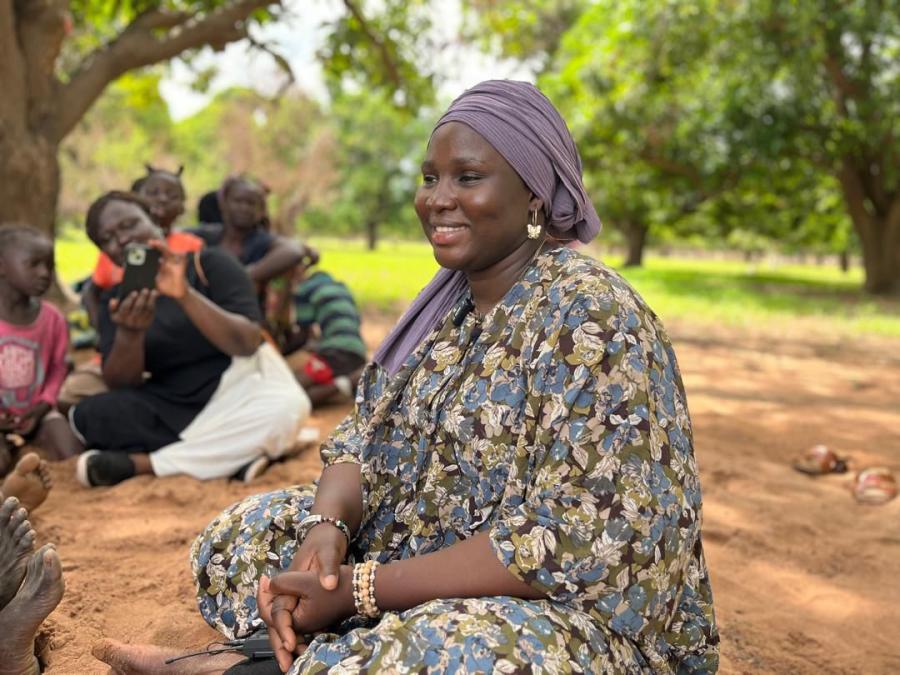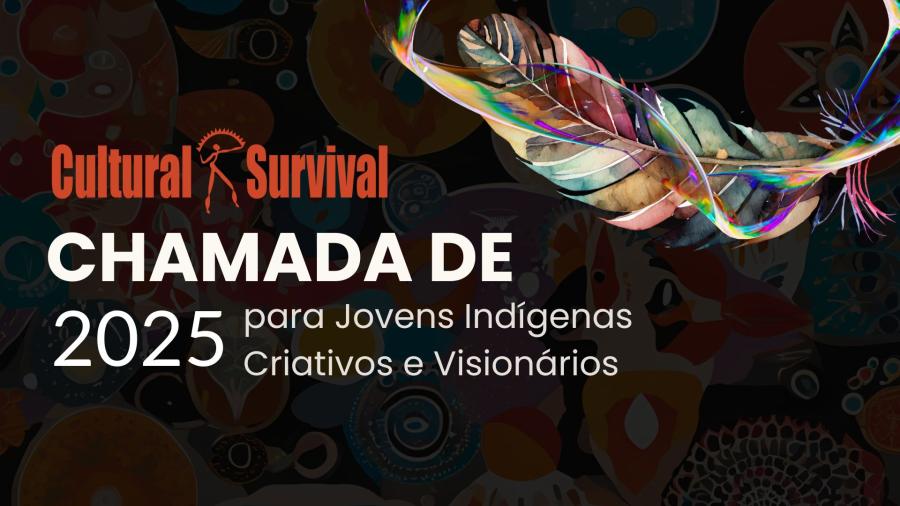
August 12 is International Youth Day, and Cultural Survival is pleased to announce our first cohort of 2024 Indigenous Youth Fellows as part of our Capacity Building Program. Our Indigenous Youth Fellowship supports young Indigenous leaders between the ages of 18-28 who are working to transform their communities and create opportunities for the elevation, defense, and strengthening of their cultures and traditional knowledge practices while developing their leadership, organizational, and project management skills. Since 2018, we have awarded 137 fellowships supporting 305 fellows.
The fellowship projects focus on language revitalization, land protection, media and art, and reclaiming traditions, among other themes. The involvement and participation of Indigenous youth are fundamental for intergenerational knowledge transfer and cultural continuity, as today's youth are the future leaders of their communities. Join us in celebrating the brilliance, creativity, and commitment of Indigenous youth around the globe. Meet the fellows here.
Learn More about our Youth Fellowships
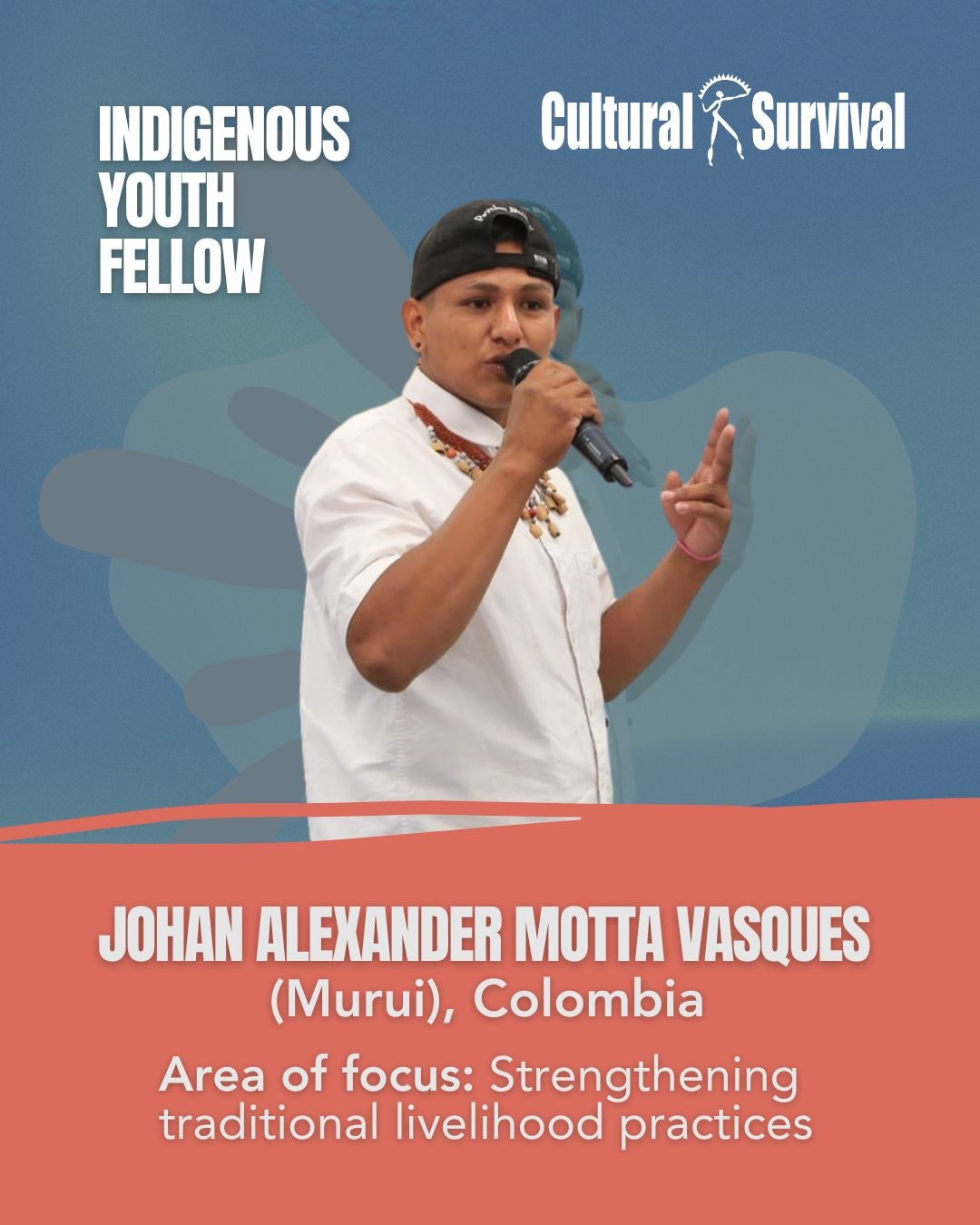
Johan Alexander Motta Vasques (Murui) from Colombia
Area of focus: Strengthening traditional livelihood practices
Website/Social Networks: https://jofoananekoamazonas.com/
Johan Alexander Motta Vásquez is Murui from the Patio De Ciencia Dulce community of Leticia, Amazonas, Colombia. After completing his primary and secondary education, which included a Systems Technician program, Johan’s life was profoundly impacted by two events in 2020: the birth of his daughter and the onset of the COVID-19 pandemic. Grounded in teachings from his Elders in traditional medicine, agriculture, and homemaking, Johan embarked on a path of leadership culminating in establishing the Jofo Ananeko Indigenous Tourism Association in 2021, which aims to promote cultural conservation and territorial control through community tourism. Johan’s dedication to environmental sustainability led him to pursue further education, and he went on to earn diplomas in sustainable rural tourism and environmental management in the Amazon. His participation in national and international forums broadened his perspective on living in harmony and inspired his candidacy for Governor of his Indigenous territory in 2024, driven by a vision of collective, productive, and sustainable development for his community. With the support of Cultural Survival, Johan is working to strengthen water systems by applying ancestral knowledge and planting water-retaining species for the survival and quality of life for his community.
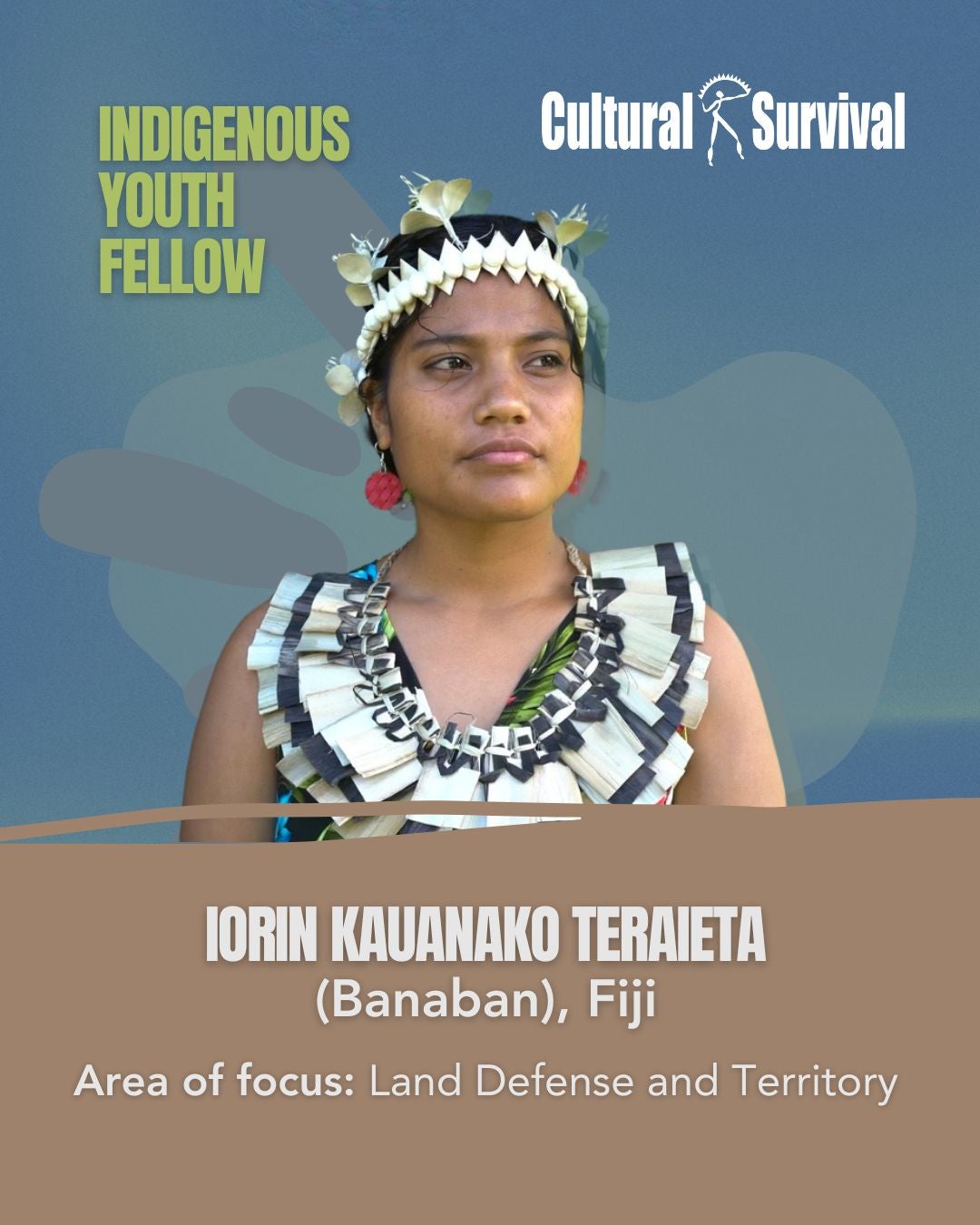
Iorin Kauanako Teraieta (Banaban) from Fiji
Area of focus: Land Defense and Territory
Website: https://icaad.ngo/justice-for-rabi/
Iorin Kauanako Teraieta is a Banaban youth advocate and community worker from the Banaban Human Rights Defenders Network and Rabi Island Community Hub (RICH). She is passionate about upholding Banaban rights, preserving her Banaban culture, and empowering Banaban youth. Iorin is Uma’s Village Focal Point and coordinator of the Rich Culture and Heritage Programme on Rabi Island. She tackles pressing issues such as the environmental crisis and climate change impacts faced by Banaban communities. Iorin’s recent efforts include opposing an Australian mining company's attempt to mine Banaba Island, highlighting the importance of community consultation and ancestral respect in preserving Banaban heritage and advocating for climate justice. Her project, “Never Again. We Say No to Mining: Defend and Protect Banaba,” aims to strengthen her community in response to potential mining interests and build solidarity and education around mining. These efforts are at the heart of the work supported by Cultural Survival.
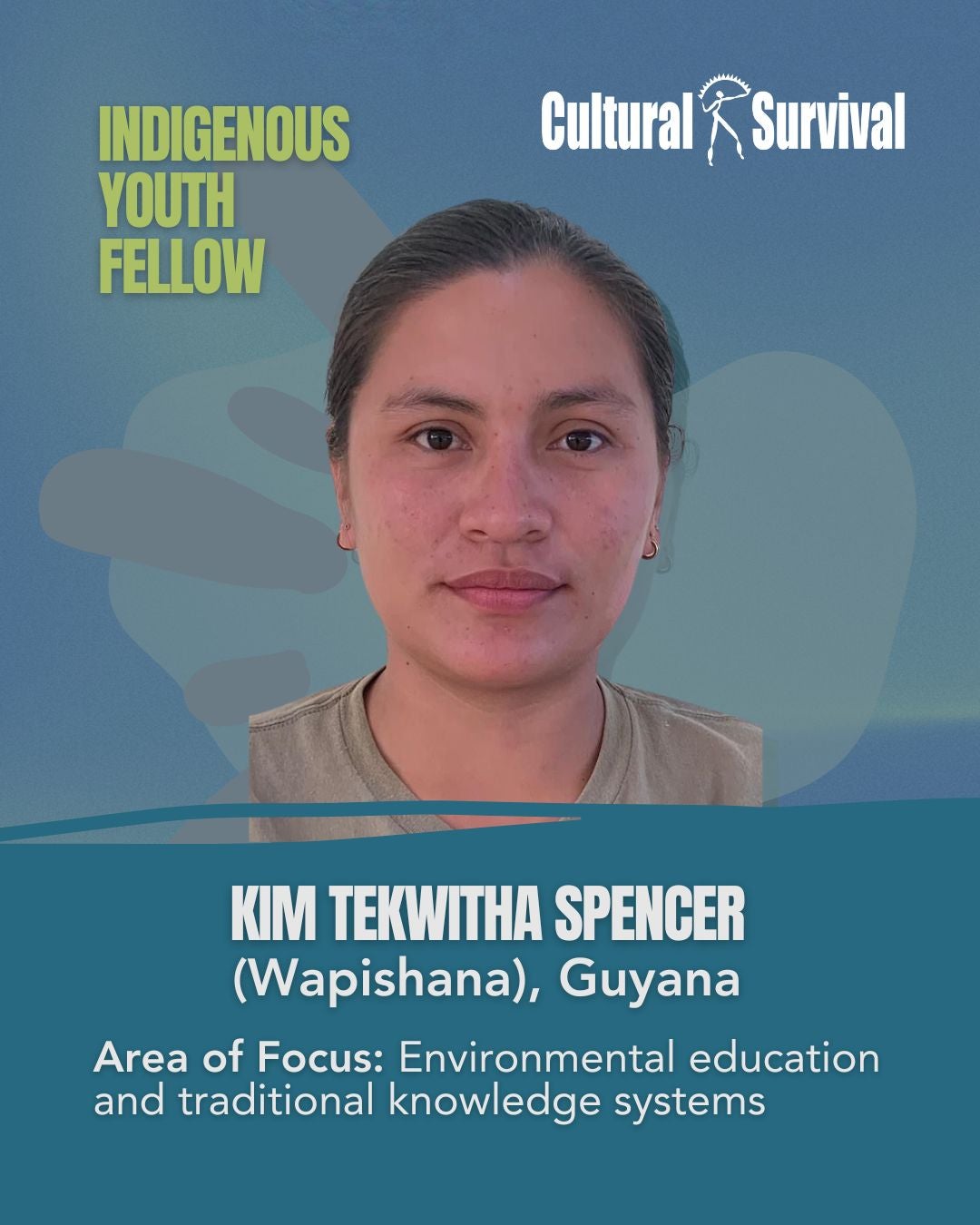
Kim Tekwitha Spencer (Wapishana) from Guyana
Area of Focus: Environmental education and traditional knowledge systems
Kim Spencer is a young Wapishana woman with a deep connection to nature who is passionate about environmental preservation. Her efforts in conservation and education are a testament to her unwavering passion and commitment to the environment. Kim's dedication to preserving Indigenous culture and traditions shone through her work as a cadet ranger with the South Rupununi Conservation Society, where she tirelessly advocated for the voices of her people to protect their way of life. She also serves her community as a mathematics teacher at Sand Creek Secondary School, where she has instilled environmental stewardship in her students by leading expeditions into the wilderness to educate them about wildlife management and ecosystem balance. Kim’s current project consists of creating safe and engaging educational spaces for Indigenous children in order to increase their knowledge of environmental issues, build their capabilities, practice their traditional crafts, and inspire them to follow leadership roles pertaining to the environment and their traditional skills.
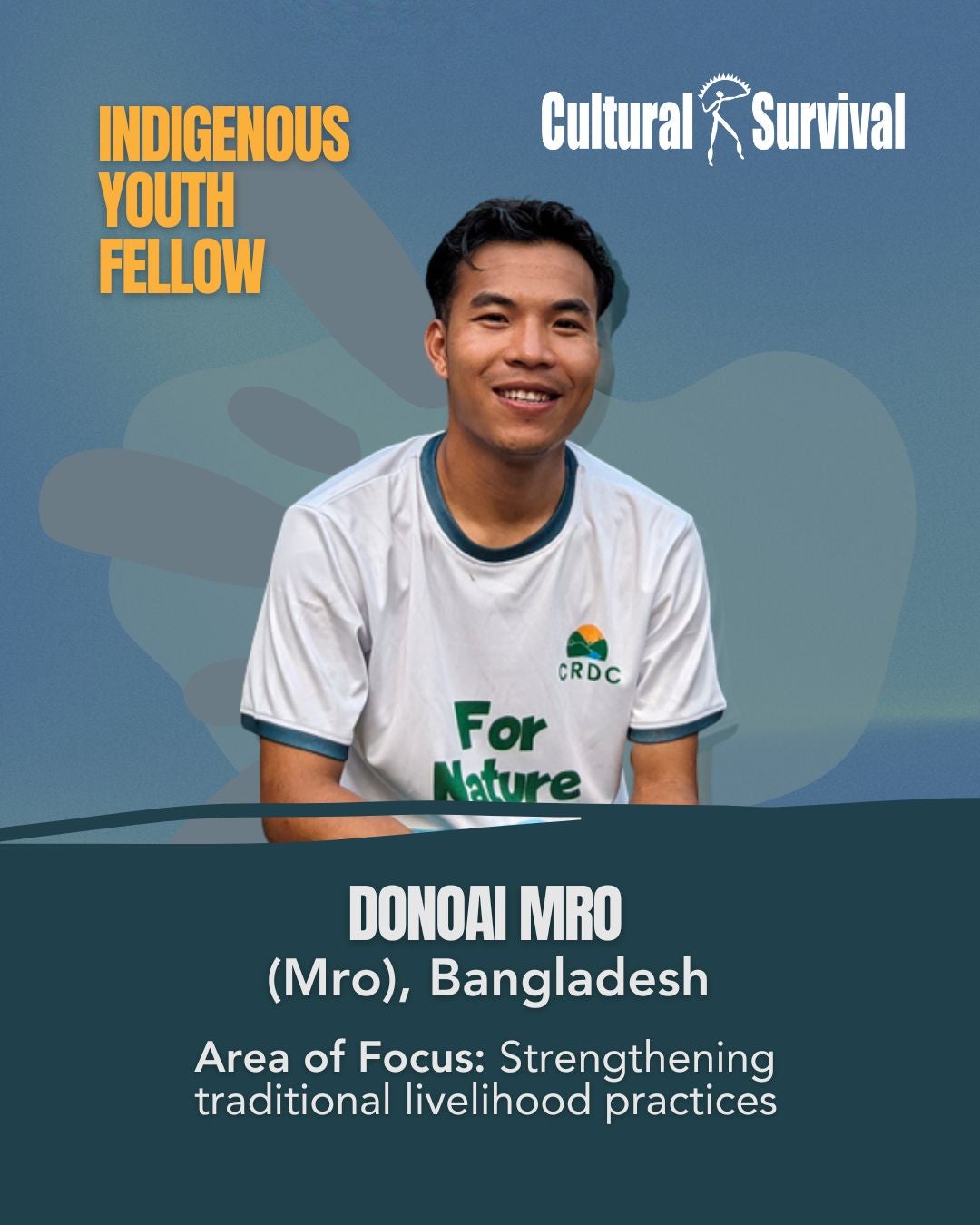
Donoai Mro (Mro) from Bangladesh
Area of Focus: Strengthening traditional livelihood practices
Donoai Mro, a native of the Chittagong Hill Tracts in Bangladesh, comes from a family of farmers. He is a graduate of the University of Dhaka with a degree in criminology focusing on environmental crime. He has a deep passion for sustainability and he loves being close to nature. He is also a rising youth leader in his community and currently acts as the Information and Publication Secretary at the Bangladesh Mro Student Association. Donoai developed the project, “tui'piya," is a Mro word which means utilizing indigenous knowledge, through which he will use Indigenous Traditional Knowledge to preserve streams in the Chittagong Hill Tracts. Donoai’s project consists of enhancing community resilience by empowering the Mro community with knowledge, skills, and resources to effectively prevent and respond to disasters exacerbated by climate change.
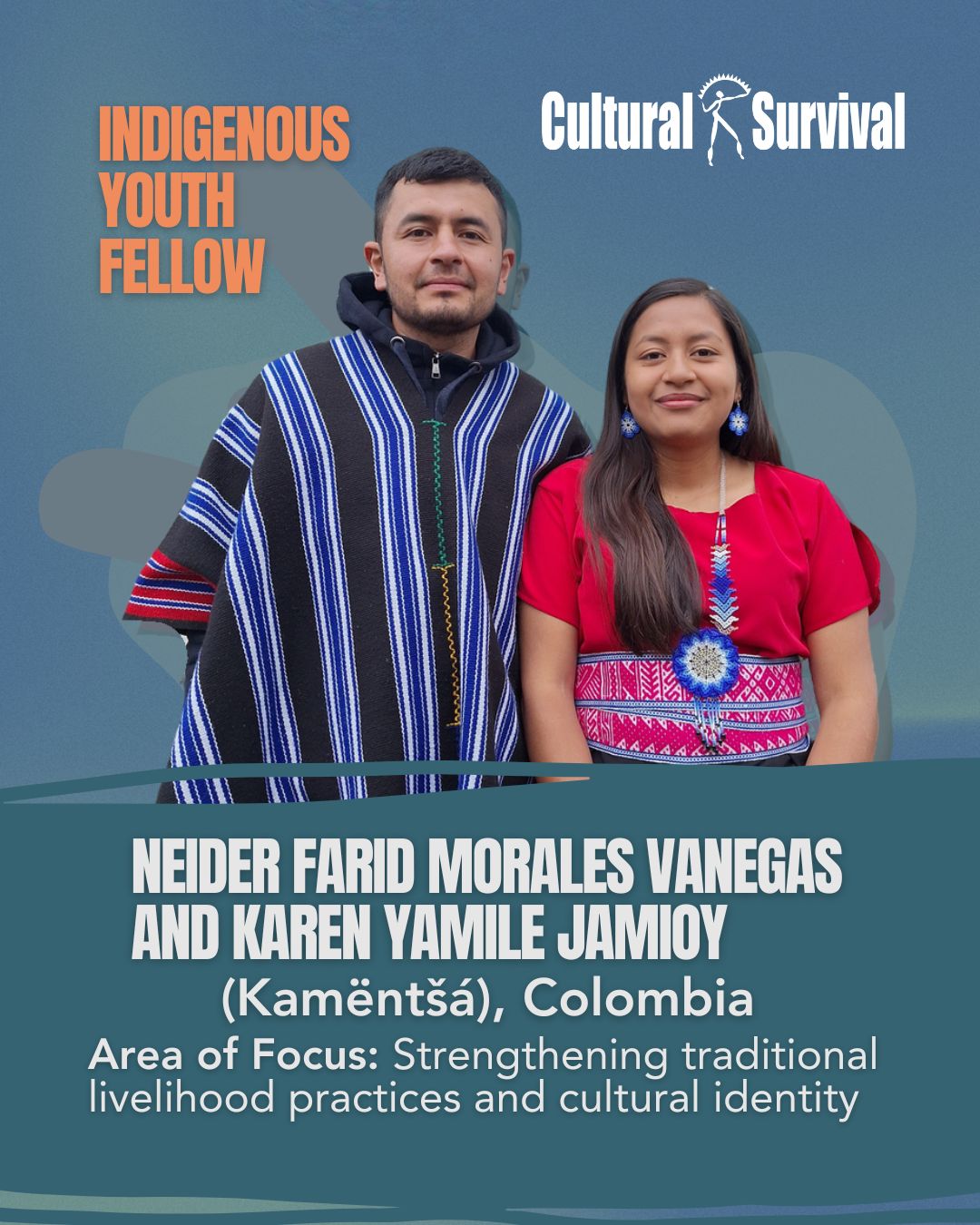
Neider Farid Morales Vanegas and Karen Yamile Jamioy (Kamëntšá) from Colombia
Area of Focus: Strengthening traditional livelihood practices and cultural identity
Neider Farid Morales and Karen Yamile Jamioy hail from the Kamëntšá community in the municipality of San Francisco within the verdant landscapes of Putumayo, Colombia.
Over the course of four years, they have emerged as fervent advocates for the preservation of their cultural identity and ancestral traditions. Together, they co-founded the collective Semilleros de Cultura, a platform dedicated to nurturing and promoting Kamëntšá heritage. Neider and Karen have dedicated themselves to learning from their ancestors and embracing age-old traditions, language, and worldviews. Their passion for safeguarding Kamëntšá culture has propelled them to organize cultural workshops, facilitate discussions on ancestral medicine, and advocate for environmental conservation within their community. Through their efforts, they inspire fellow Indigenous youth to take pride in their heritage and assume leadership roles in shaping the future of their community. Their project, “Indigenous Communities: Guardians of Nature,” aims to improve and strengthen the capacity of Indigenous communities to address the challenges posed by climate change and to protect the environment.
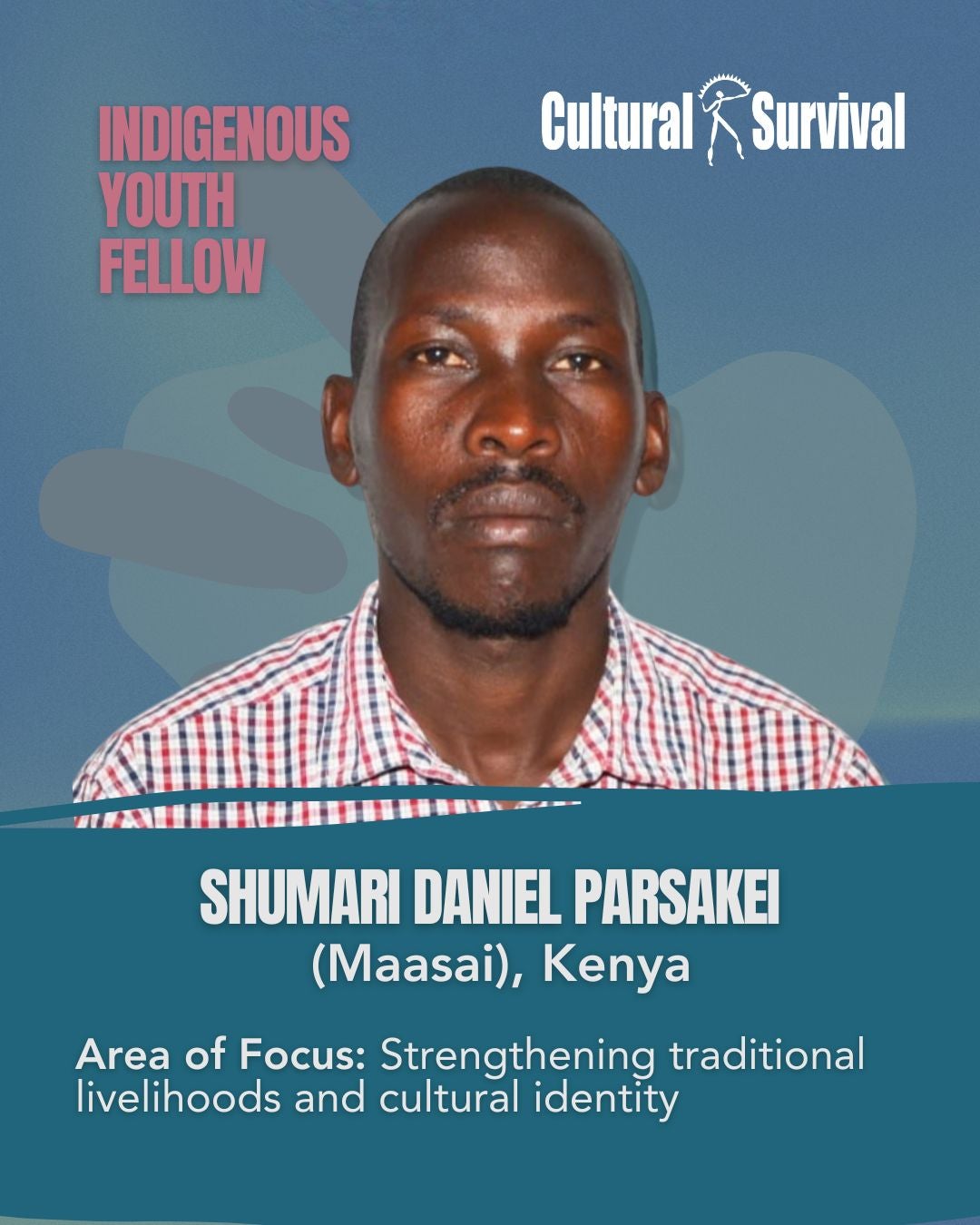
Shumari Daniel Parsakei (Maasai) from Kenya
Area of Focus: Strengthening traditional livelihoods and cultural identity
Shumari Daniel Parsakei is a Maasai youth from the Maasai community in Kenya. He is actively involved with youth organizations in Trans Mara, Narok County, and recently graduated from the University of Nairobi with a bachelor’s degree in Environmental Conservation and Natural Resources Management. Shumari works as an Extension and Coordination officer at the community level where he engages with youth in the community, facilitating programs on sustainable agriculture in response to reduced land availability at home, promoting the transfer of intergenerational Traditional Knowledge, and addressing issues related to climate change.
Shumari’s project, “Enhancing Youth Access to Reproductive Resources, Environmental Conservation, and Promoting Culture,” will support Maasai Indigenous youth in Transmara, Narok County. The project will provide resources and knowledge to help them address challenges related to climate change, access to reproductive resources, and the gap in intergenerational knowledge transfer. This will be achieved through training on land ownership, climate change mitigation, and environmental conservation. Additionally, the project will facilitate dialogues with community leaders, elders, women, and youth in open meetings to discuss cultural issues and ensure the transfer of intergenerational knowledge.
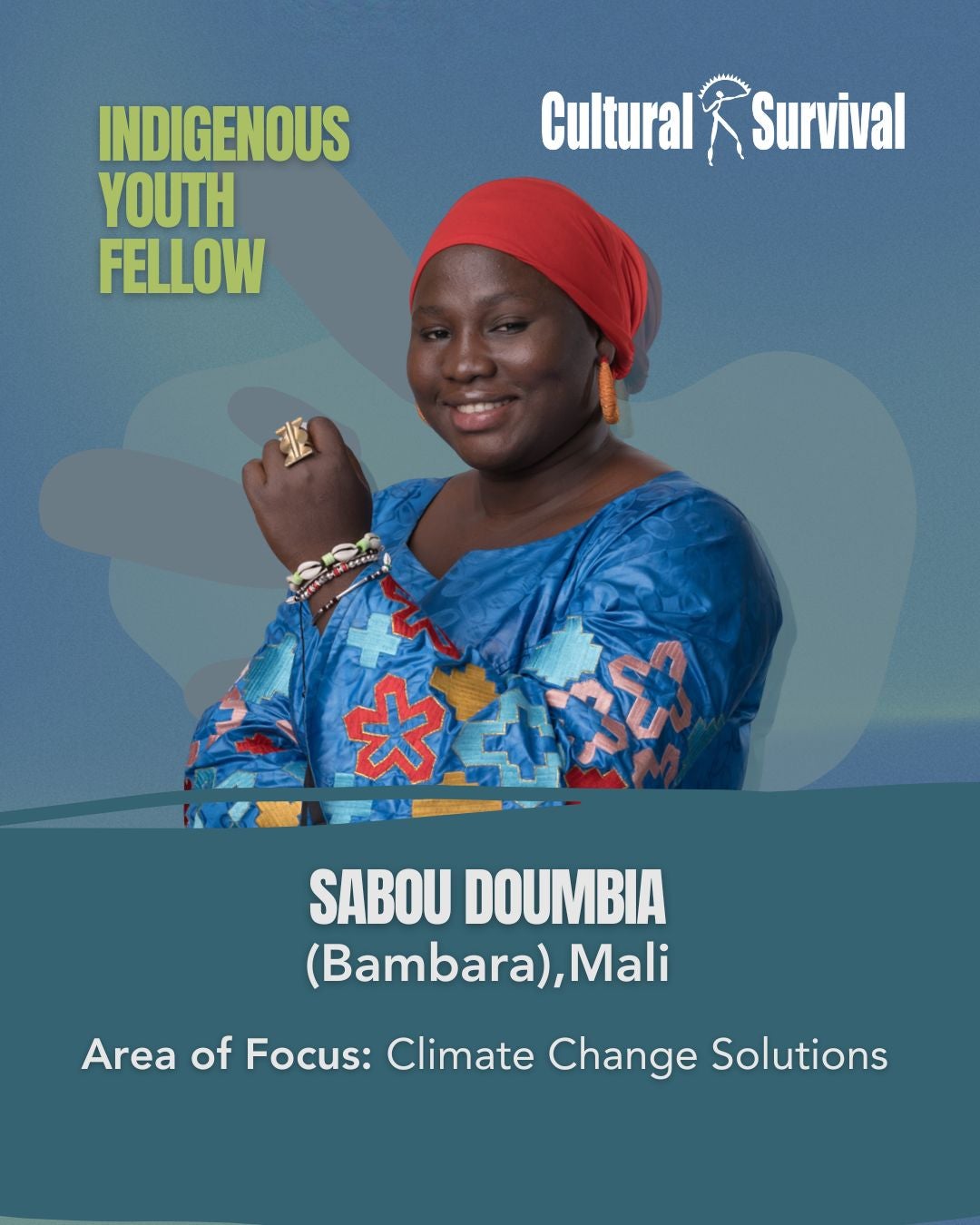
Sabou Doumbia (Bambara) from Mali
Area of Focus: Climate Change Solutions
Sabou Doumbia is from the Bambara community. She is a computer scientist with a degree from the Institut de Science et Technologie Appliquée in Bamako. Beyond her expertise in computer science, she is also an entrepreneur in the fields of community development, project management in waste management, and the circular economy. Sabou comes from a large family and grew up in a neighborhood where community solidarity deeply influenced her childhood, and has dedicated herself to community-driven economic development projects. Her fellowship project, "Preserving Our Lands and Our Bambara Futures," aims to raise awareness among the women of the village of Siby, particularly the Bambara community, about the impacts of climate change on their lands. Her initiative advocates for sustainable agriculture and the use of ecological fertilizers to promote environmentally friendly practices suited to local agricultural realities.
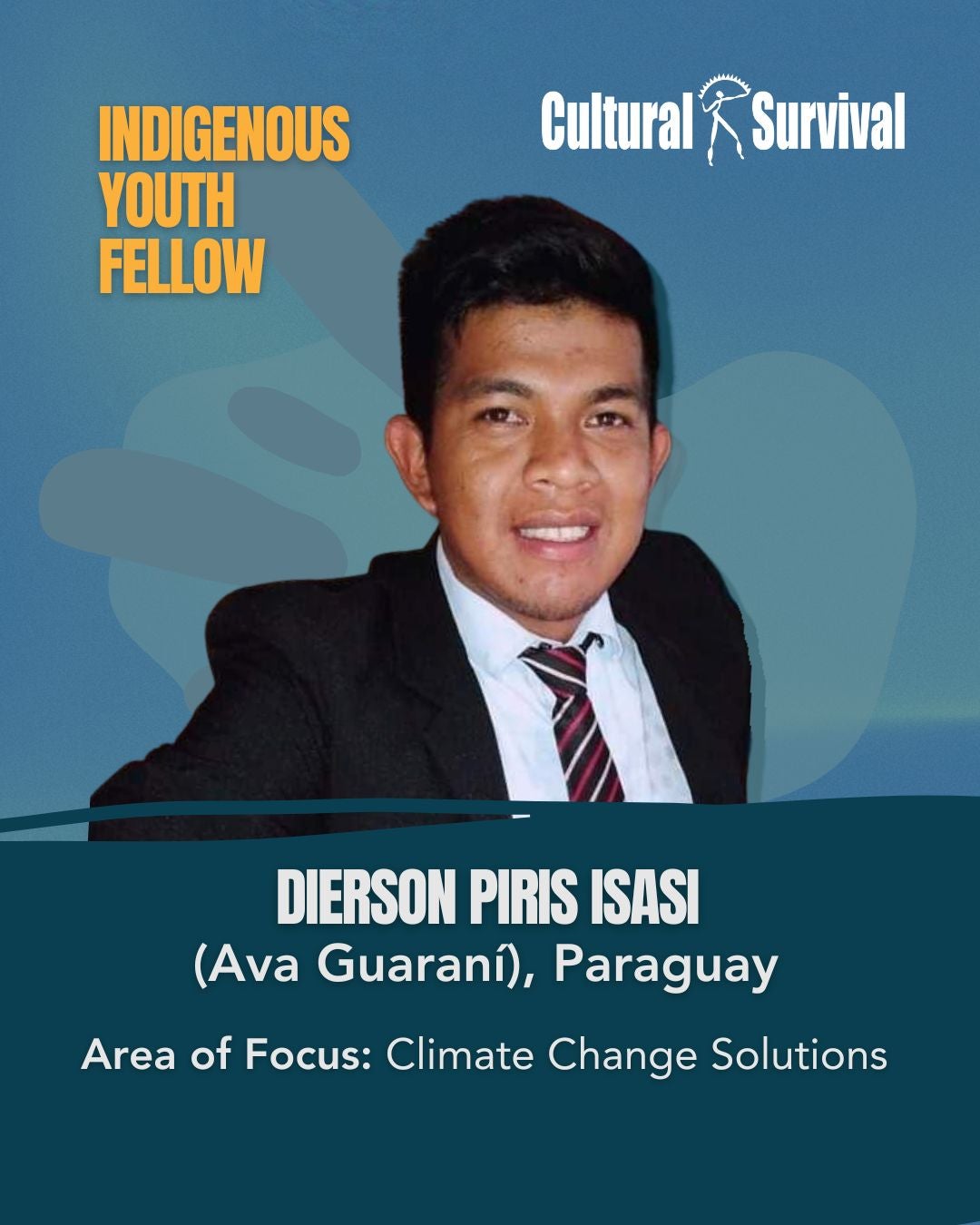
Dierson Piris Isasi (Ava Guaraní) from Paraguay
Area of Focus: Climate Change Solutions
Dierson Piris Isasi is from the Mytuy community in Curuguaty, Paraguay. He works as a teacher in his community's schools where he strives to instill the traditional values of his roots in his students, whom he affectionately calls his brothers. Currently, Dierson is in his final year of studying Law. He is driven by a passion to fight for the rights of his people after witnessing the discrimination and institutional mistreatment he faced as a child. His project, “Reforestación y Educación Ambiental” (Reforestation and Environmental Education), promotes reforestation and environmental education within the Mytuy community.
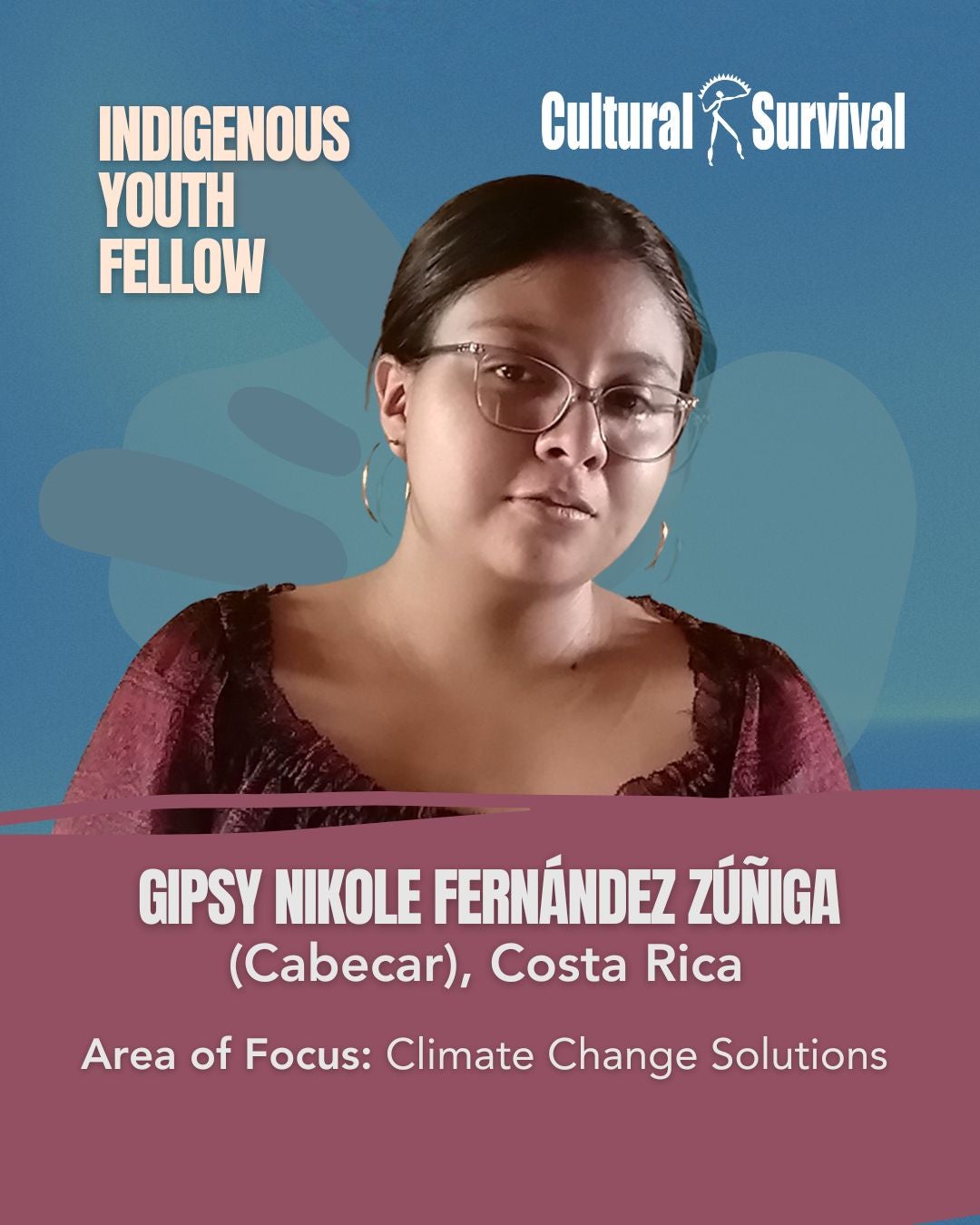
Gipsy Nikole Fernández Zúñiga (Cabecar) from Costa Rica
Area of Focus: Climate Change Solutions
Gipsy Nikole Fernández Zúñiga is from the Cabecar community of Ujarrás, Buenos Aires, Puntarenas, Costa Rica, and is currently studying Natural Resources Management at the State University of Costa Rica. She is passionate about nature and believes that every positive action counts towards its preservation. Her project, “Soluciones de cambio climático relacionados con sistemas sostenibles” (Solutions of climate change related to sustainable systems), aims to implement practices to reduce emissions and ensure sustainability on the planet.
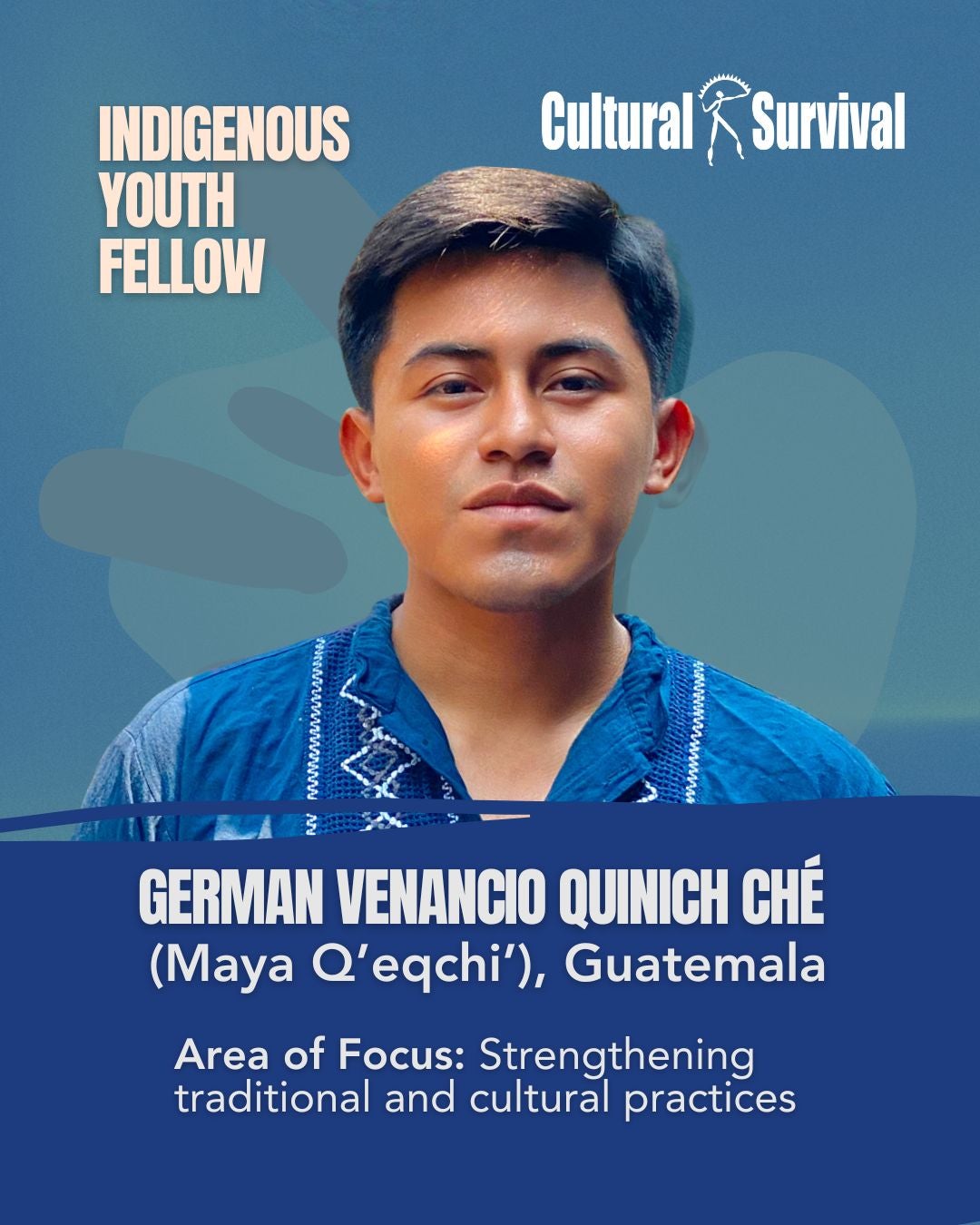
German Venancio Quinich Ché (Maya Q’eqchi’) from Guatemala
Area of Focus: Strengthening traditional and cultural practices
German Venancio Quinich Ché is a Maya Q'eqchi activist from Guatemala dedicated to protecting the environment and the collective rights of Indigenous Peoples. After growing up in a fishing community, German graduated with a degree in Administration and now defends the lake that provided him with his education and sustenance. He is fighting against a mining company that threatens the lake and the surrounding mountains and valleys, a struggle that has led to the violence, imprisonment, and persecution of those who defend their land. German’s project, “Arte Ancestral” (Ancestral Art), aims to find innovative sources of income in the textile market and rescue the ancestral weavings of the region. The project will also raise awareness in the broader population about the weavings, as each thread means struggle and resistance.
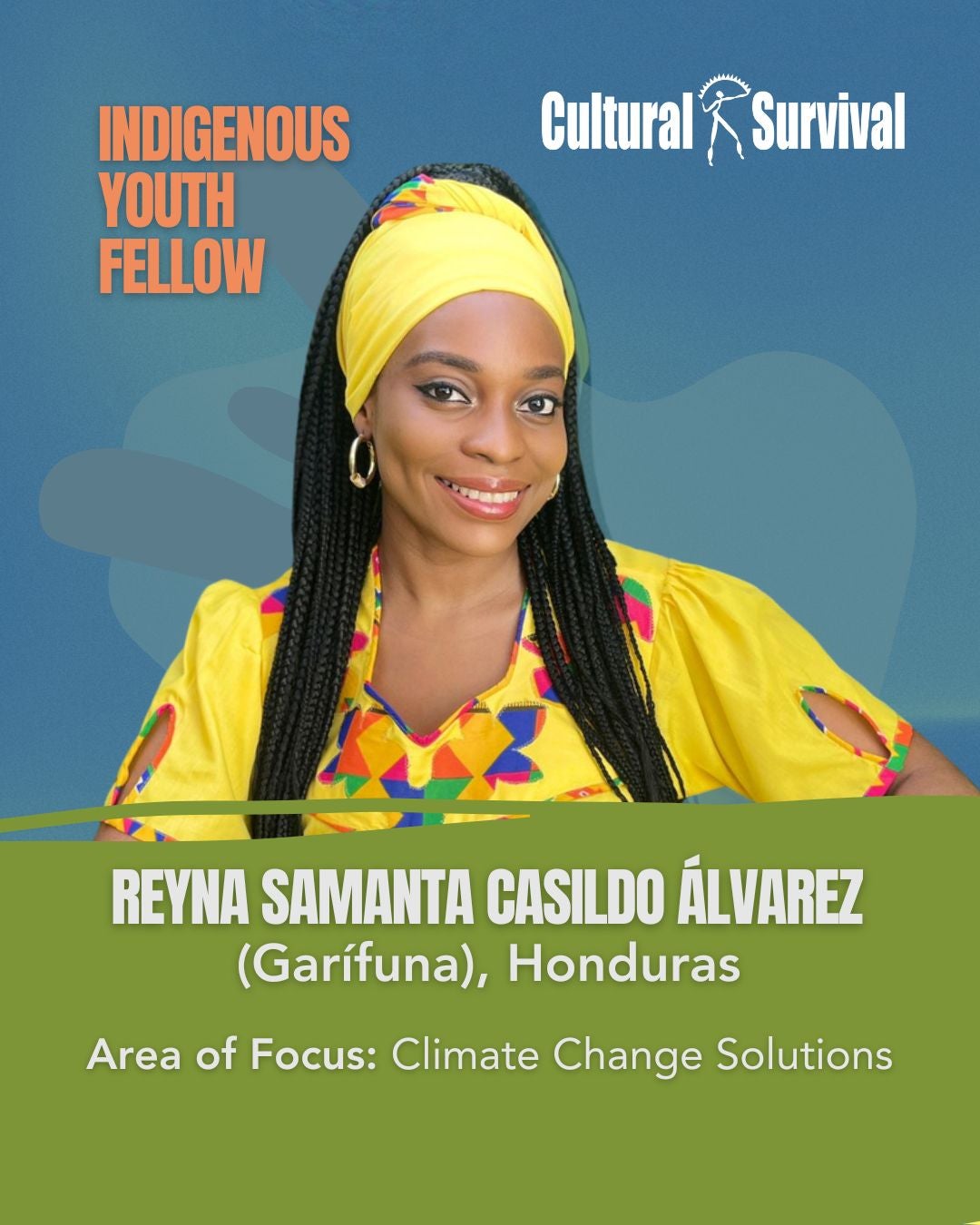
Reyna Samanta Casildo Álvarez (Garífuna) Honduras
Area of Focus: Climate Change Solutions
Reyna Samanta Casildo Álvarez is a Garifuna woman from Honduras. She is an independent consultant, lecturer, and advocate for academic excellence with degrees in Industrial Production Engineering and Renewable Energy Management and Energy Efficiency. Samanta has received extracurricular training in human rights, Indigenous and Afro-descendant issues, gender rights, green recovery, the just energy transition, migration and development, and energy management.
She has over eight years of experience as a volunteer in civil society organizations and government commissions, and is a former fellow of the Indigenous Political Participation Program where she represented Honduras in cultural meetings. Samanta is also the President and founder of Afrohn for Change, and serves as the Executive Secretary and Coordinator of the Afro and Indigenous Youth Network of Honduras. Her project, “Foro sobre Cambio Climático y Desarrollo Sostenible, una mirada hacia las comunidades garífunas” (Forum on Climate Change and Sustainable Development, a look at the Garifuna communities), is focused on providing knowledge to young people from different educational centers of the communities with the objective of contributing to the strengthening and awareness of the student community about the impacts of climate change and its effects on the Garifuna communities.
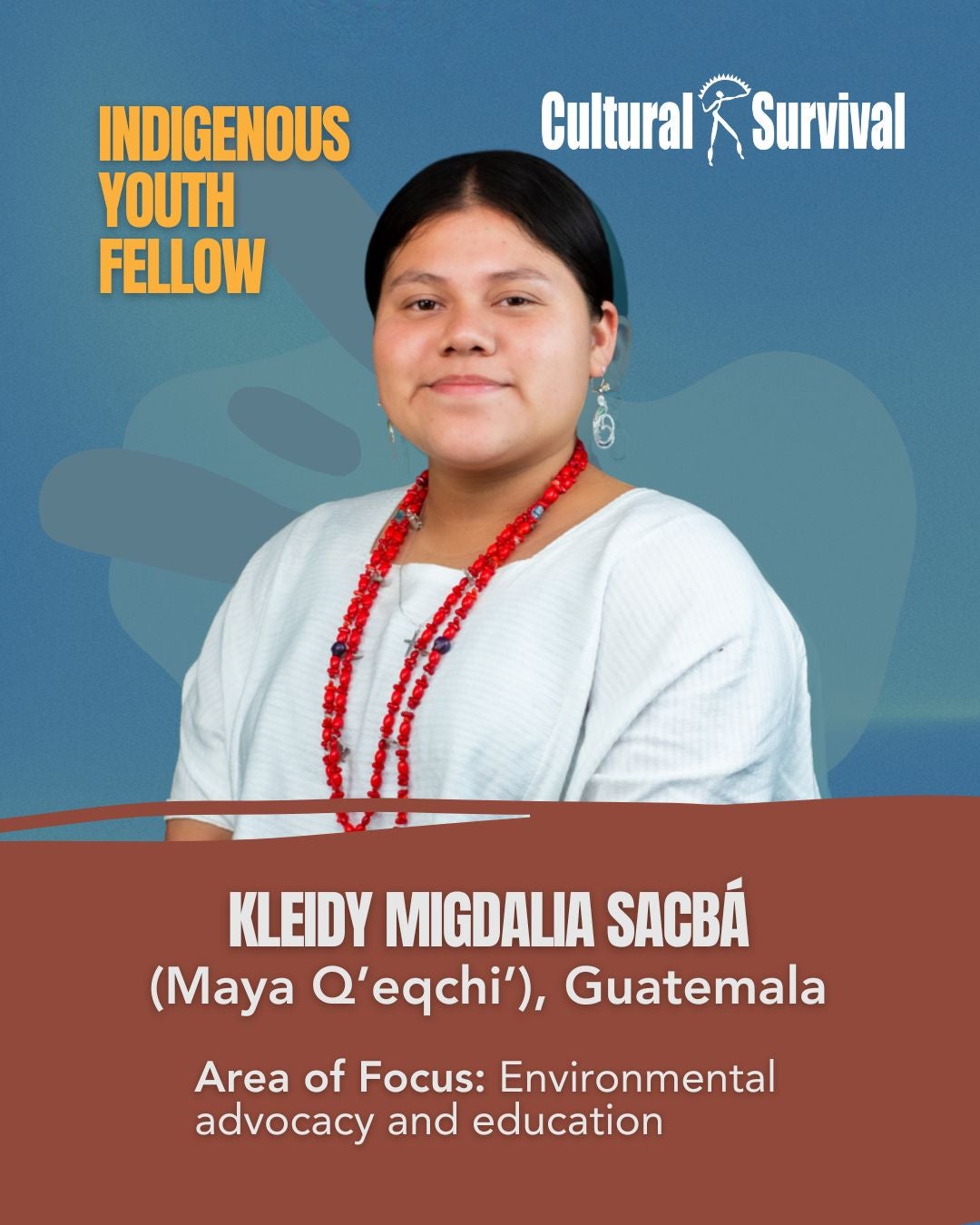
Kleidy Migdalia Sacbá (Maya Q’eqchi’) from Guatemala
Area of Focus: Environmental advocacy and education
Kleidy Migdalia Sacbá Coc is a Maya Q'eqchi' woman from Guatemala. She holds multiple titles and has been recognized for her work in promoting Indigenous rights and protecting the environment. Kleidy is an expert in natural resources with a focus on sustainability and is currently studying Agronomic Engineering. She has participated in various forums and courses related to environmental issues and transformational leadership. She is a member of the Regional Coalition for the Right to Live in a Healthy Environment in Central America and works for Conexión Icco LatinoAmerica, promoting the development and empowerment of youth and Indigenous women. She is also actively involved in environmental initiatives such as reforestation campaigns and advocating for water freedom. Additionally, Kleidy has worked on climate change adaptation projects and promotes youth participation and the implementation of a National Youth Law in Guatemala, emphasizing the importance of socio-environmental action for future generations. She is implementing the project “Q’eqchi’ Xnimal Ruhil Chaq’rab’,” which is an environmental digital education platform that aims to inform people about environmental issues.
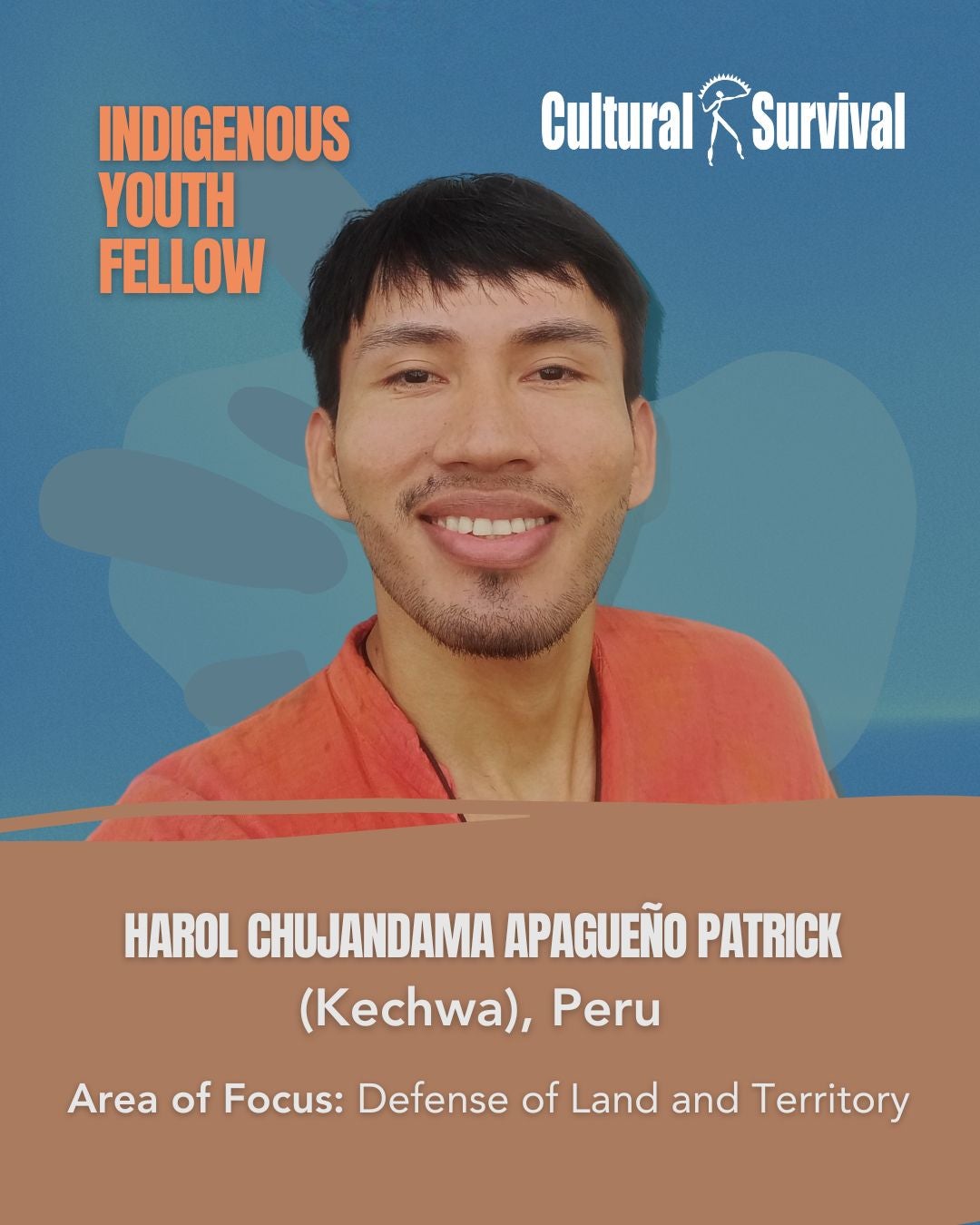
Harol Chujandama Apagueño Patrick (Kechwa) from Peru
Area of Focus: Defense of Land and Territory
Harol Chujandama Apagueño Patrick is from the Kechwa People of the Amazon in Peru. He has been actively involved in supporting his community and the FEPIKECHA organization, participating in various training and initiatives. Harol also engages in networking, advocacy, and organizing events to support Indigenous rights and forest conservation. Cultural Survival supports Harol’s project, “Visibilizar para resistir: protegiendo a los de defensores del Bajo Huallaga” (Make visible to resist: protecting the defenders of Bajo Huallaga), which aims to shine a light on the problems experienced by the communities of Bajo Huallaga in relation to the defense of their territory in order to strengthen their resistance against threats through the uniting of efforts between civil society and the State.
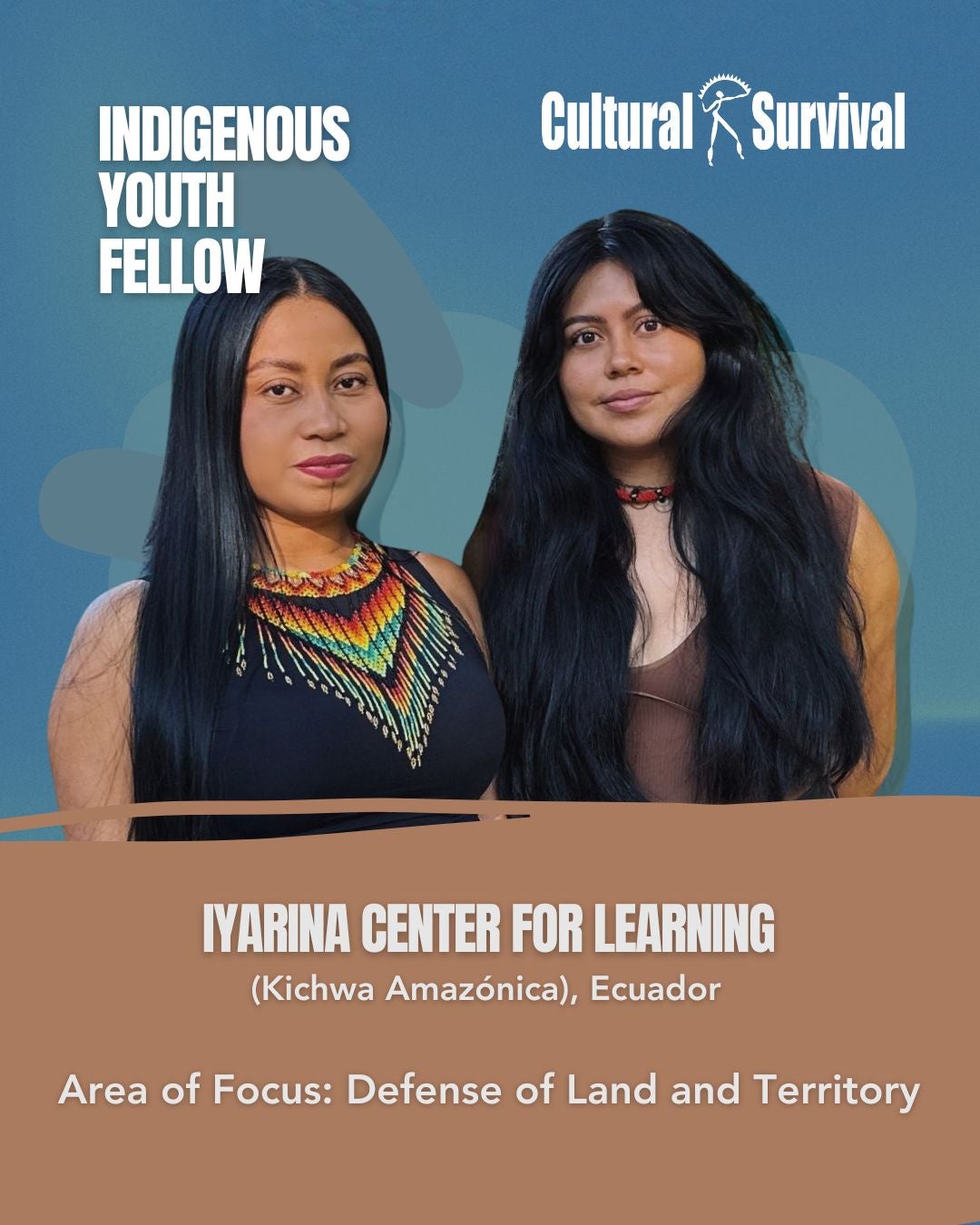
Iyarina Center for Learning (Kichwa Amazónica) from Ecuador
Area of Focus: Defense of Land and Territory
Elizabeth Virkina and Cindy Sisa are from the Kichwa community of Venecia Derecha, located on the banks of the Napo River in the Ecuadorian Amazon. They are cousins who grew up under the same roof and now are recognized emerging youth leaders. They oversee projects such as Solar Canoes Against Deforestation, Productive Food Forests, Rainforest Virtual Reality, and NSF Ecological. Their goal is to create alternative forms of income for Indigenous Peoples in their home region as a way to combat the destruction of their territory and create a pathway to a sustainable future. Their project, “Reclaiming our narrative, Reforesting our minds,” focuses on audiovisual documentation of Kichwa Peoples’ history in the province of Napo, Ecuador. Their goal is also to strengthen ancestral lands and mitigate community conflicts exacerbated by the gold rush.

Interdisciplinary Collective of the Province of Jujuy from Argentina
Area of focus: Livelihoods and Land Defense from Negative Impacts of Transitioning to the Green Economy
Samanta Jimena Delgado and her team members, Rocio Julián, Lourdes Lopez, and Marina Laureano Vilte, are part of an interdisciplinary collective in the province of Jujuy, Argentina. The collective is unique as it is composed of women and individuals of diverse genders, including professionals in law, environmental sciences, social work, and research. They are critical thinkers, workers, and students, and members of the Kolla People, who predate the Argentinean National State. Their main focus is to actively and passionately fight against racism and the patriarchy, as well as defend their territory for self-determination and human rights. Their work is particularly vital in a time when protests are criminalized, repression is prevalent, and extractivism is intensifying. Their project, “Acompañamiento comunitario en defensa de la tierra, territorio y los bienes colectivos comunes" (Community support in defense of land, territory, and common collective goods), consists of territorial work in the face of extractivist intensification for the green energy transition and the installation of the ultra-right in Jujuy.

Wara Iris Ruiz Condori (Aymara) from Bolivia
Area of focus: Indigenous Community Media
Wara Iris Ruiz Condori is an Aymara woman working as a Project Coordinator in climate justice and biodiversity for Indigenous Peoples on the international, regional, and local levels. She is a student of environmental journalism, thanks to the support of International Working Groups in Indigenous Affairs. Additionally, she is a recipient of the International Land Coalition fellowship (2023), Latin American Youth Climate Scholarship (2023), Changemakers for Change for the Planet (2023), DCN Global (2022), Slow Food Youth Network (2022), and Young Leaders of Americans Initiatives (2022). Her project, “PACA,” is an initiative that aims to strengthen skills in journalism and environmental communication and digital tools in order to preserve the knowledge, mythology, testimonies, and chronicles of Indigenous women and youth.
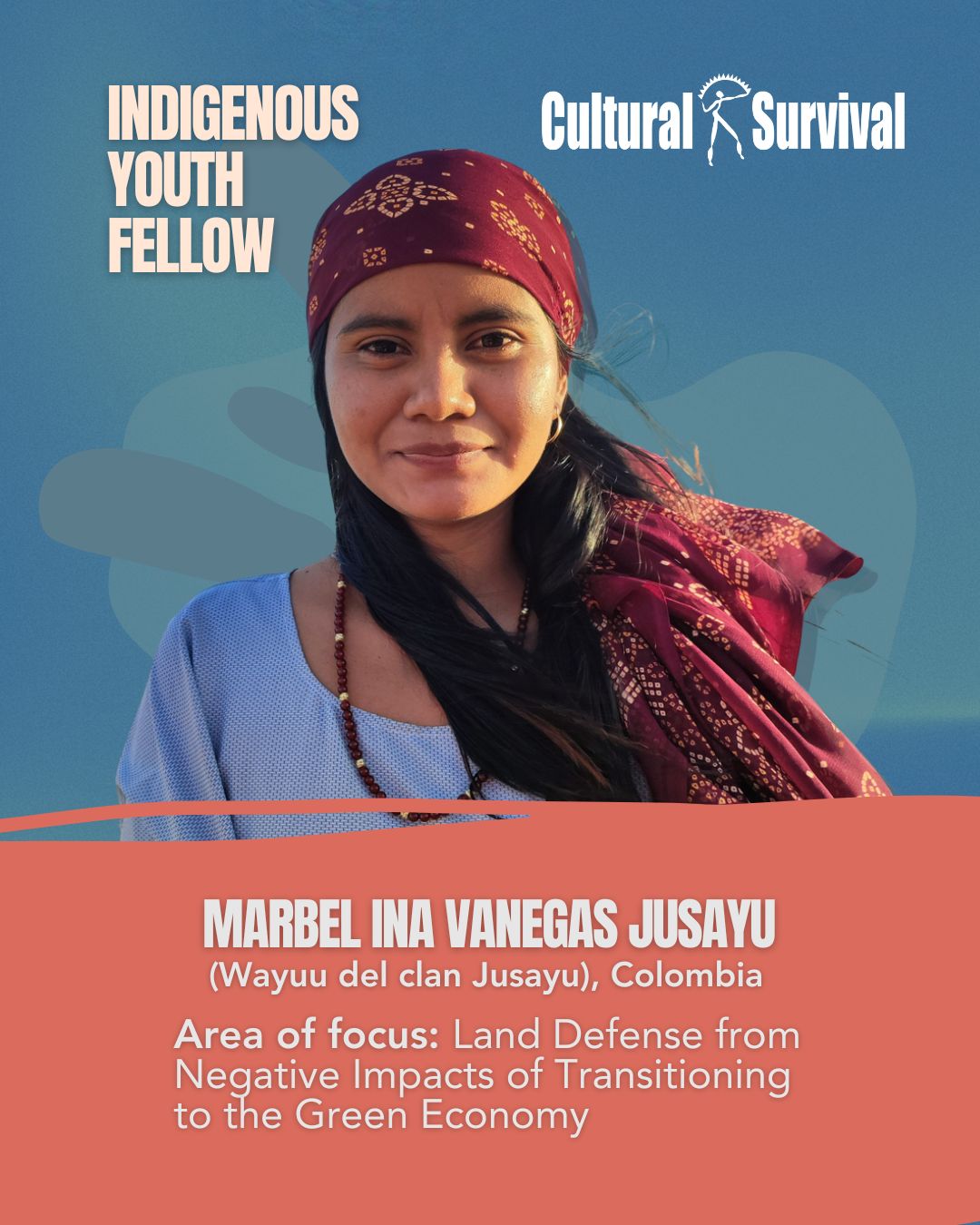
Marbel Ina Vanegas Jusayu (Wayuu del clan Jusayu) from Colombia
Area of focus: Land Defense from Negative Impacts of Transitioning to the Green Economy
Marbel Ina Vanegas Jusayu is Wayuu from the e'iruku community. She is an Indigenous community communicator with an emphasis in audiovisuals. She graduated from the film conservatory of the National Film School and the School of Communications Wayuu Putchimaajana de la Guajira. Marbel is a director and producer of audiovisual content for film and television, and has extensive experience in Indigenous organizations in radio and technical compliance for the implementation of public policy for Indigenous communication in Colombia. With the support of Cultural Survival, she is implementing the project “Ishoshi/Territorio rojo” (Red Territory) to record the first audiovisual report on the construction of a wind farm in the Wayuu community of Apotnojushi in the department of La Guajira.
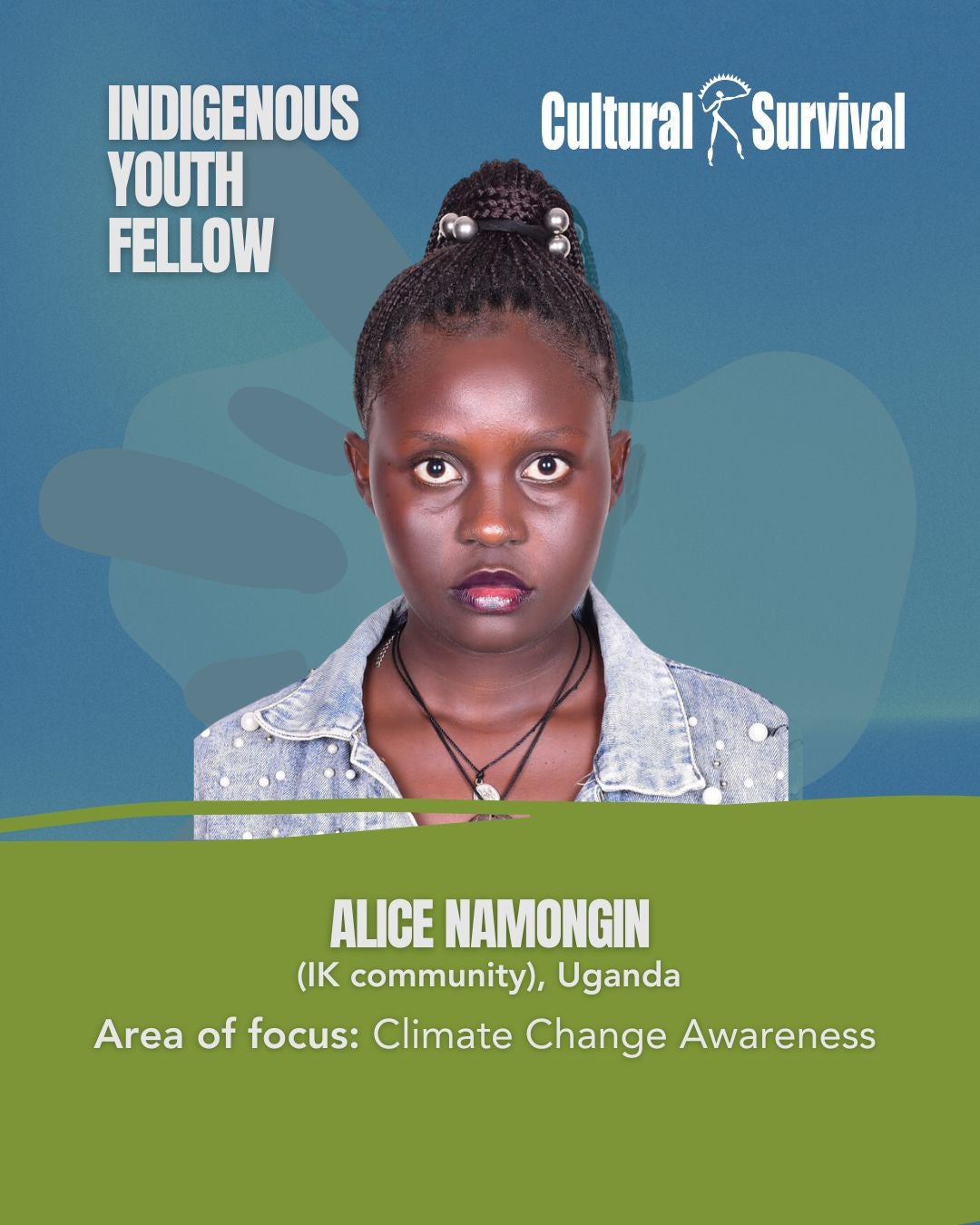
Alice Namongin (IK community) from Uganda
Area of focus: Climate Change Awareness
Alice Namongin is a native of the Karamoja subregion in Uganda and a recent graduate of Makerere University with a bachelor's degree in Business Statistics. Throughout her academic and professional career, she has focused on research, collaboration, and advocacy to promote sustainability and mitigate environmental harm. She has been involved in pioneering research projects, community engagement initiatives, and advocacy campaigns. Alice is passionate about youth welfare and impacting communities, particularly in the field of education and the environment. With her multicultural background and interest in community integration, she has undertaken various volunteer and community leadership roles, including an internship at the Karamoja Peace Development Agency where she participated in peace dialogues, youth workshops, and stakeholder meetings. She was also active in the mobilization of the Karamoja groups for the Karamoja Cultural Festival, a platform for cultural displays and peace promotion.
Her project, “Nurture Nature,” aims to empower and uplift the youth in the Karamoja subregion and the whole of Uganda. She will establish a comprehensive program that champions climate change awareness, fostering sustainable agricultural practices and nature protection and ensuring inclusive representation with a specific focus on promoting gender equality and uplifting underrepresented voices in the pursuit of a resilient and equitable future for the community.
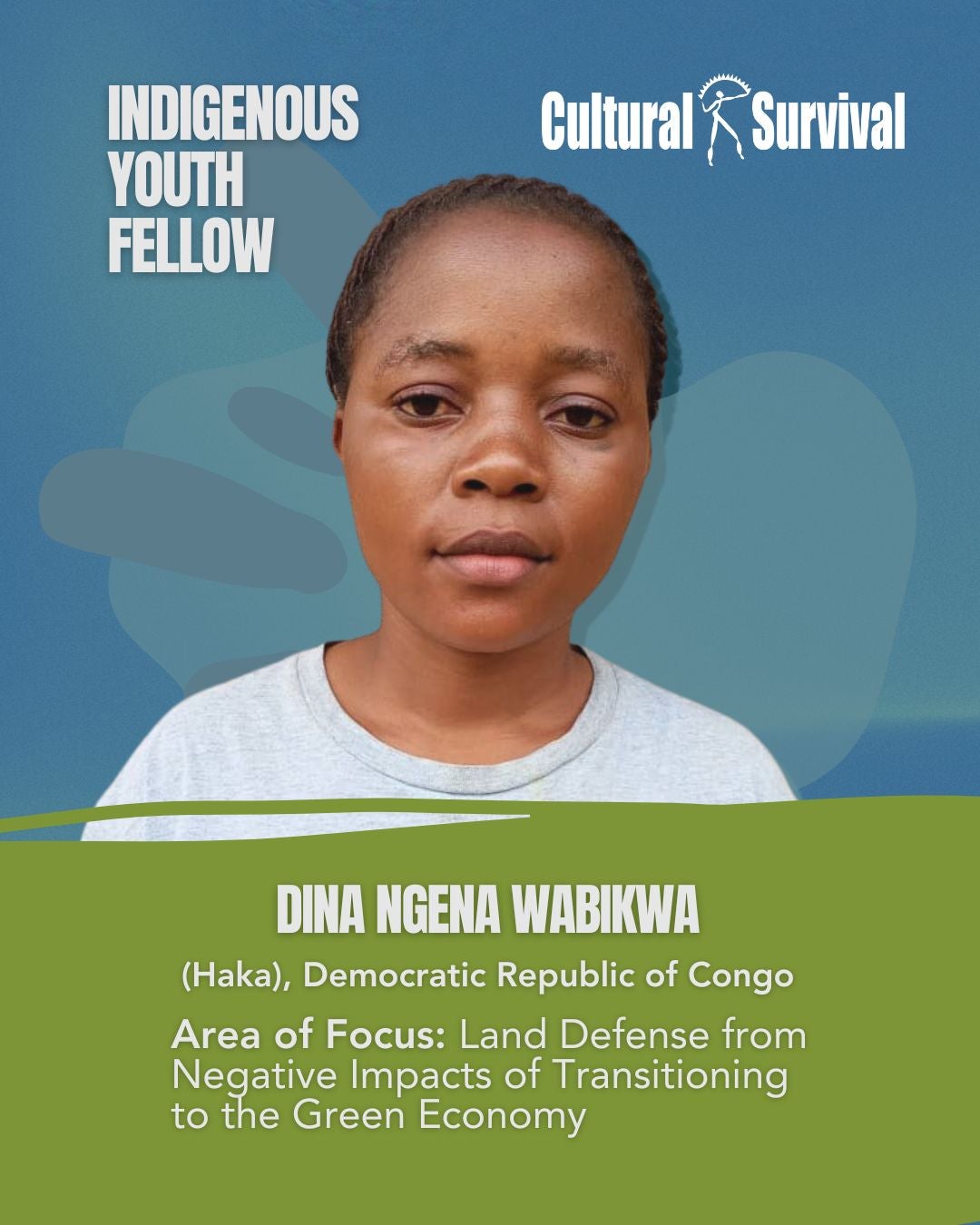
Dina Ngena Wabikwa (Haka) from Democratic Republic of Congo
Area of Focus: Land Defense from Negative Impacts of Transitioning to the Green Economy
Dina Ngena Wabikwa, a Congolese Pygmy Haka woman, is passionate about nature conservation and works as a community conservator and paralegal. Her community lives in the Itombwe rainforest and has relied on the waters of the Elila River for thousands of years. However, the increasing demand for transition minerals has led to the establishment of mining companies in the villages, resulting in pollution of the river and grave consequences for the population. In response, Dina helps her community to organize and to address this problem. She is engaged to help to find a solution and gain access to environmental justice for her community, especially in light of the growing pollution caused by mining companies.Her project, “Projet de renforcement de la bonne gestion des eaux de la rivière Elila face à l'exploitation de minerais de transition dans le massif d'Itombwe au Sud-Kivu” (Project to strengthen the good management of the waters of the Elila River in the face of the exploitation of transition minerals in the Itombwe massif in South Kivu), aims to combat water pollution in the Elila River caused by mining operations.
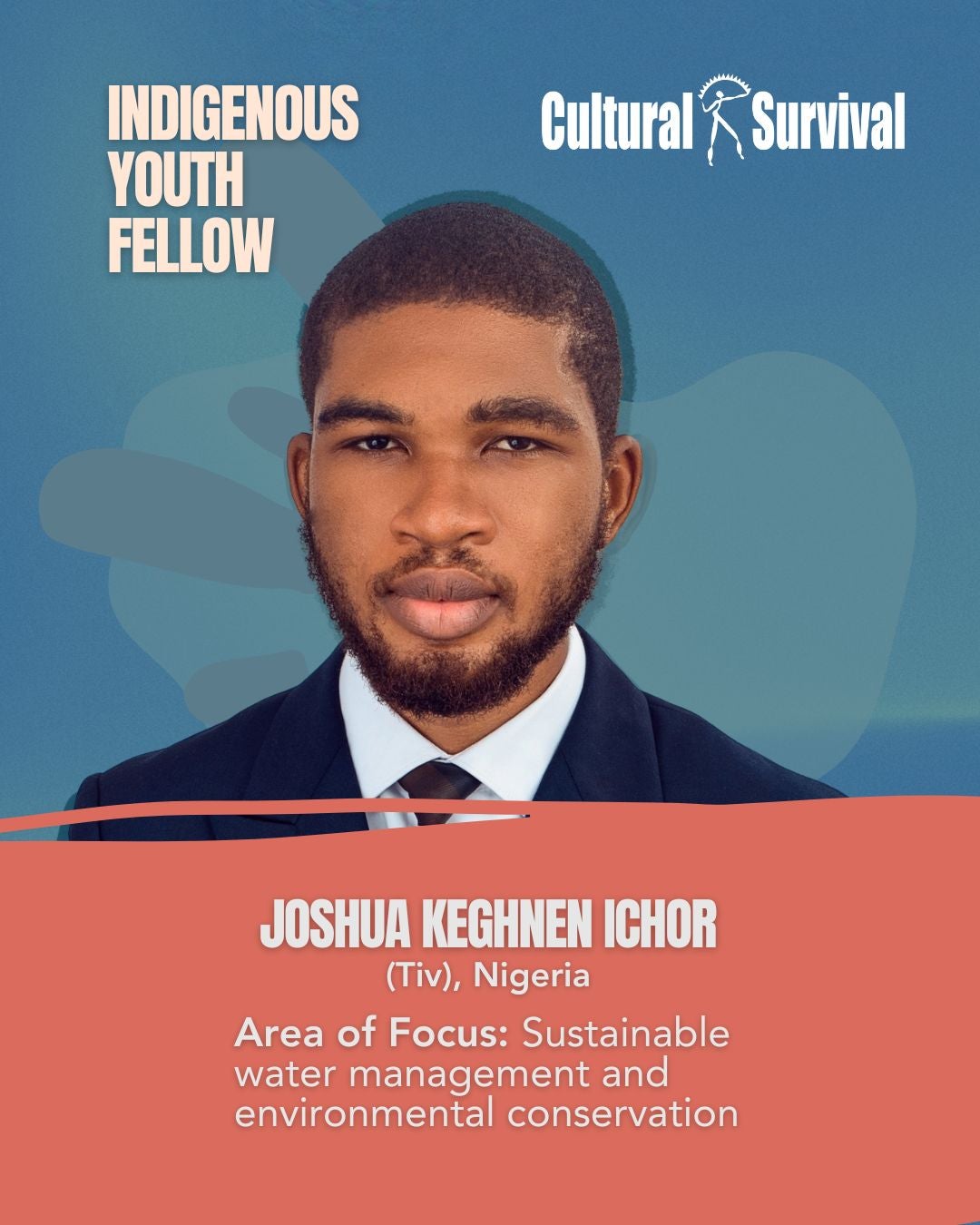
Joshua Keghnen Ichor (Tiv) from Nigeria
Area of Focus: Sustainable water management and environmental conservation
Joshua Keghnen Ichor is a geologist and water expert from the Tiv community in Nigeria. He has dedicated his life to addressing water scarcity and climate change in sub-Saharan Africa. With a passion for environmental sustainability and social impact, he has focused on harnessing technology for sustainable water management and environmental conservation. Joshua founded Geotek, an organization that pioneers innovative solutions in water treatment, infrastructure monitoring, groundwater exploration, and climate adaptation. He is also actively involved in advocacy and training initiatives to raise awareness and empower local communities for environmental sustainability. Joshua’s work extends globally, as he collaborates with international organizations, research institutions, and government agencies to drive progress in the field of water and climate resilience. His efforts have been recognized with prestigious awards, including the Young Climate Prize and the Swarovski Creative Prize. Cultural survival supports his project, “The Geotek Water,” which is fundamentally geared towards the Tiv Tribe and other affected communities in Northern Nigeria to create a sophisticated water monitoring and management system powered by technology.
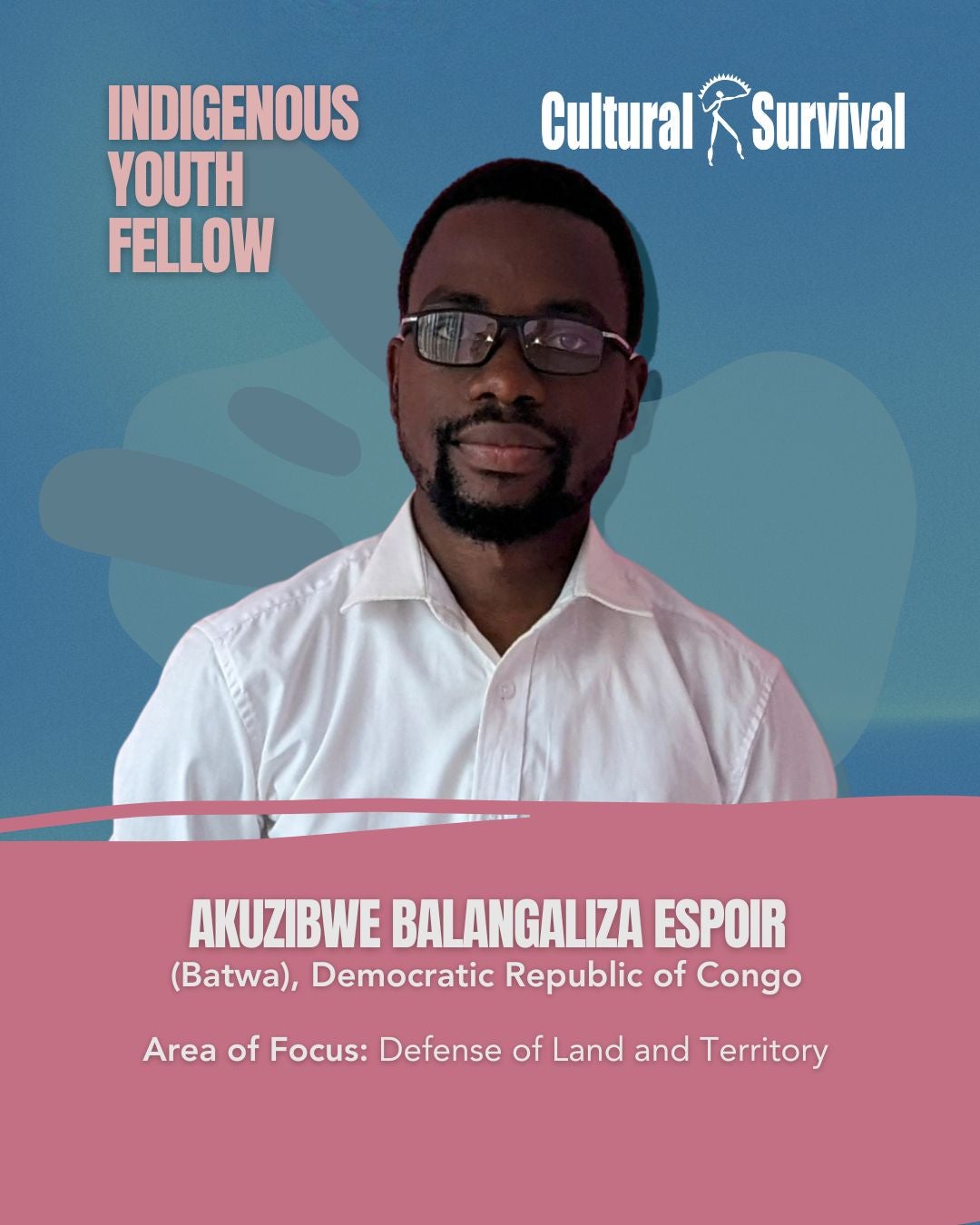
Akuzibwe Balangaliza Espoir (Batwa) from Democratic Republic of Congo
Area of Focus: Defense of Land and Territory
Akuzibwe Balangaliza Espoir (Espoir Balangaliza) is a young advocate for Indigenous Peoples in the Democratic Republic of Congo. He is the Coordinator of the Climate Space Network, which brings together several Indigenous Peoples’ and civil society organizations in eastern DRC. He is also an African Union youth delegate in DRC and a Peace and Climate Ambassador for Peace World International. Espoir has been actively involved in projects and initiatives promoting Indigenous Peoples’ rights at national, regional, and international levels since 2017. He is particularly focused on volunteering and advocating for the protection of displaced people and strengthening Indigenous culture through community engagement. He has participated in various conferences, including the Africa Climate Summit in Nairobi and the global youth climate conference in Tanzania. Espoir’s involvement in COP28 in Dubai allowed him to contribute to international negotiations on the defense of Indigenous Peoples’ rights. His project, “La promotion et la vulgarization des briquettes produites à base des biomasses” (The promotion and popularization of briquettes produced from biomass), promotes biomass briquettes as an alternative energy source to deforestation in the Bambote and Batwa Indigenous communities of Fizi village in the province of Sud Kiv in response to Sustainable Development Goal 7.
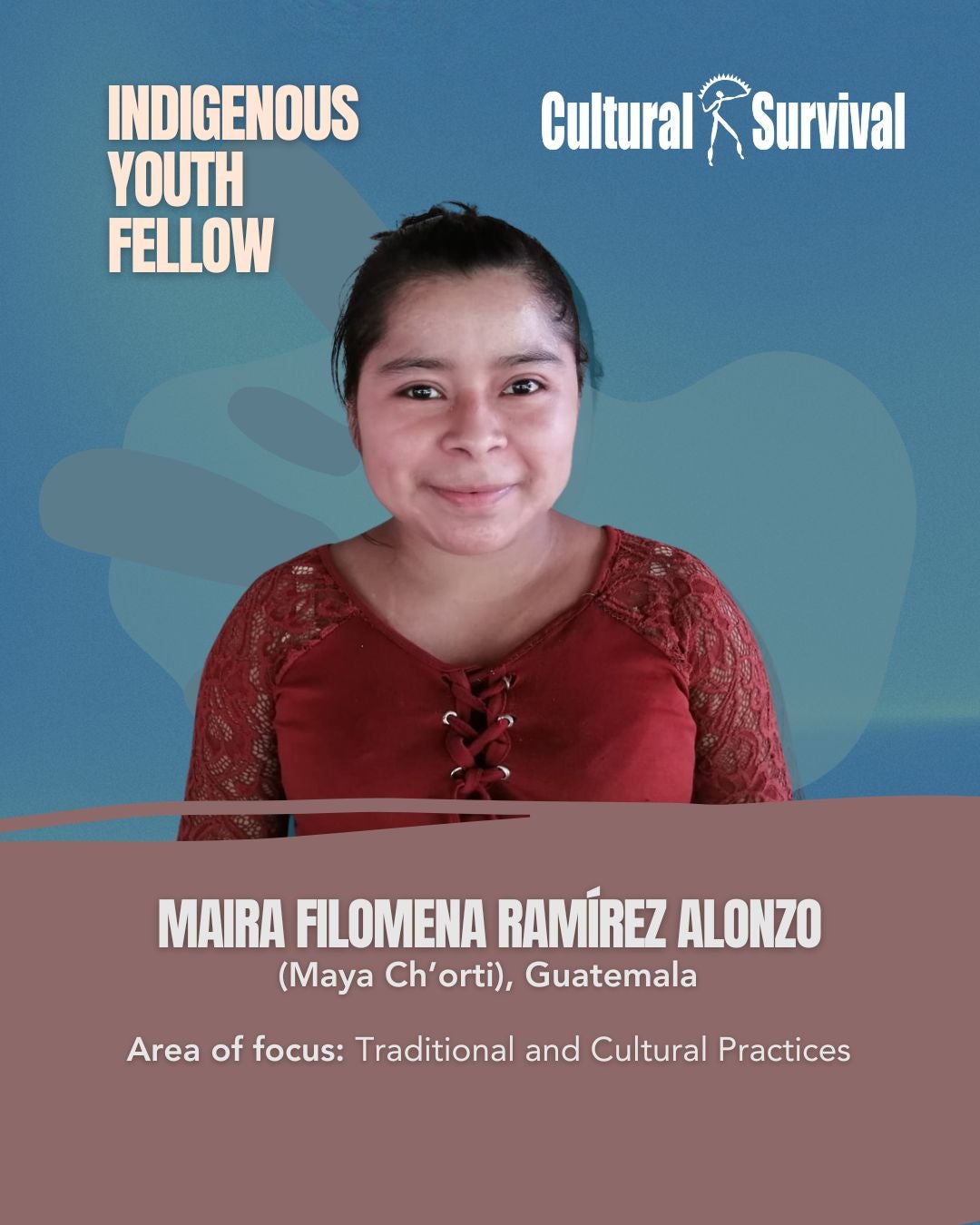
Maira Filomena Ramírez Alonzo (Maya Ch’orti) from Guatemala
Area of focus: Traditional and Cultural Practices
Maira Filomena Ramirez Alonzo is Maya Ch'orti' from Olopa Chiquimula, Guatemala. She is an artisan, human rights defender, community communicator, and part of the Maya Ch'orti' Indigenous Council of Olopa. She has been involved in community organization, including the recovery of land, forests, rivers, water sources, and the preservation of her culture. Maira is actively involved in resisting the exploitation of the earth by mining companies, as well as advocating for the rights and well being of her community at local, national, and international levels. She is passionate about preserving her cultural heritage, specifically the craftsmanship of making maguey fiber products using natural dyes, a tradition passed down by her mother and grandmothers. She believes that the practices of her people can contribute to solving global issues such as climate change. Her project, “Rescante de nuestras raíces y conocimiento de la artesanía de maguey del pueblo Maya Ch’orti” (Rescuing our roots and knowledge of the maguey crafts of the Mayan Ch'orti People), aims to recover the ancestral knowledge of the Maya Ch'orti' people of the community of Tituque Olopa, Chiquimula.
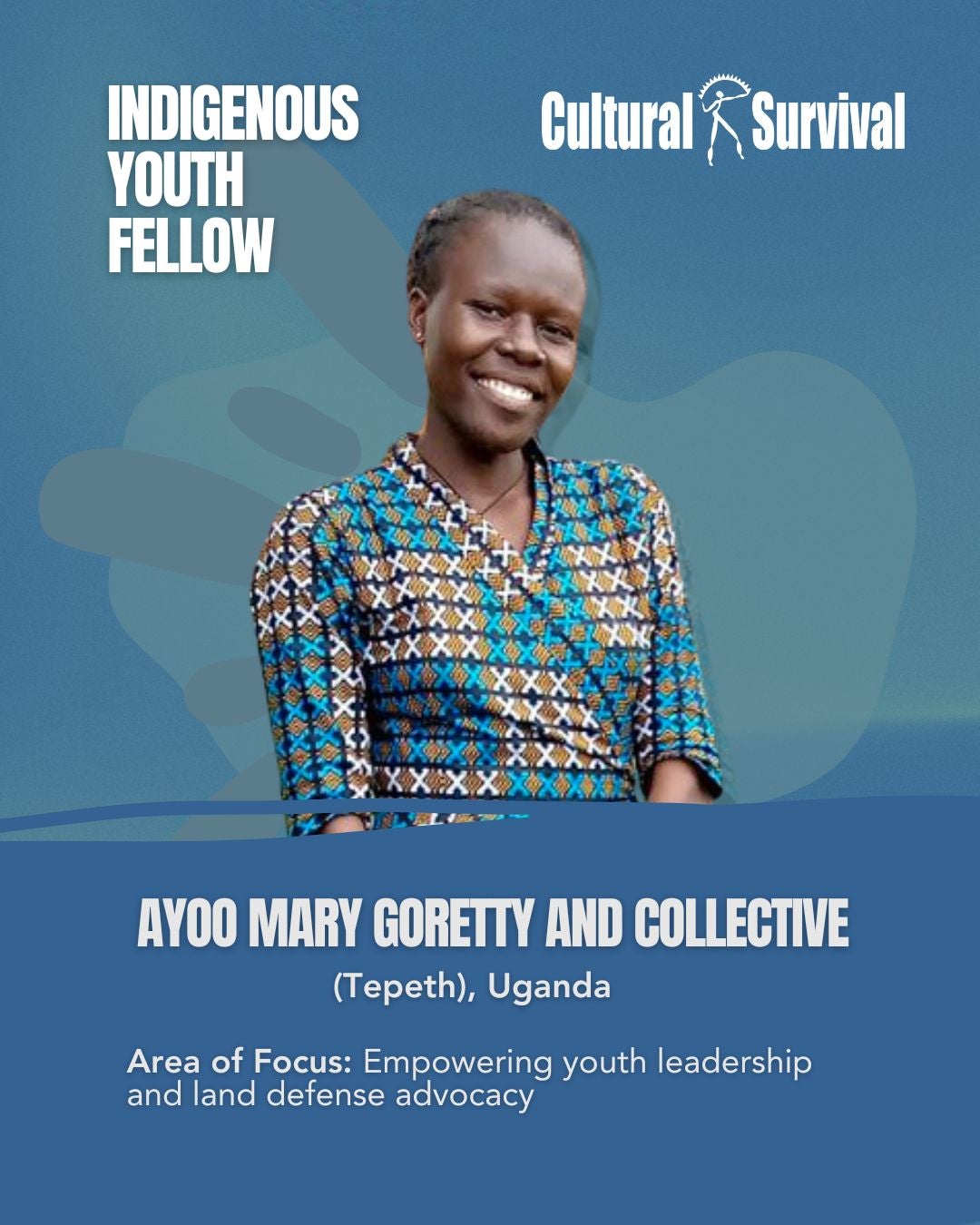
Ayoo Mary Goretty and Collective (Tepeth) from Uganda
Area of Focus: Empowering youth leadership and land defense advocacy
Ayoo Mary Goretty is from the Tepeth community in the Moroto district. She is an advocate and a community development worker actively engaged in various community activities. She loves interacting with youth, especially persons living with disabilities. Ayoo is inspired by her community's willingness to learn and transform into responsible citizens who appreciate their Tepeth traditions.
Angura is from the Tepeth community in the Moroto district. He is a dedicated, hardworking advocate and social worker with experience in community engagement who looks forward to creating positive change in his community.
Chegem is from the Tepeth community in the Moroto district and speaks the Soo language. She is passionate about her community's growth and is actively involved in strengthening youth capacity and land defender advocacy initiatives. Chegem is dedicated to empowering and strengthening youth activities to defend their language and culture. She is inspired by the community's willingness to learn and embrace change and become responsible citizens who understand the importance of their Tepeth traditions. Their project, “Youth Capacity Strengthening and Advocacy on Land Life Defenders,” targets youth in Katikeile Moroto and empowers them through advocacy to defend their land and protect the environment for future sustainable development.
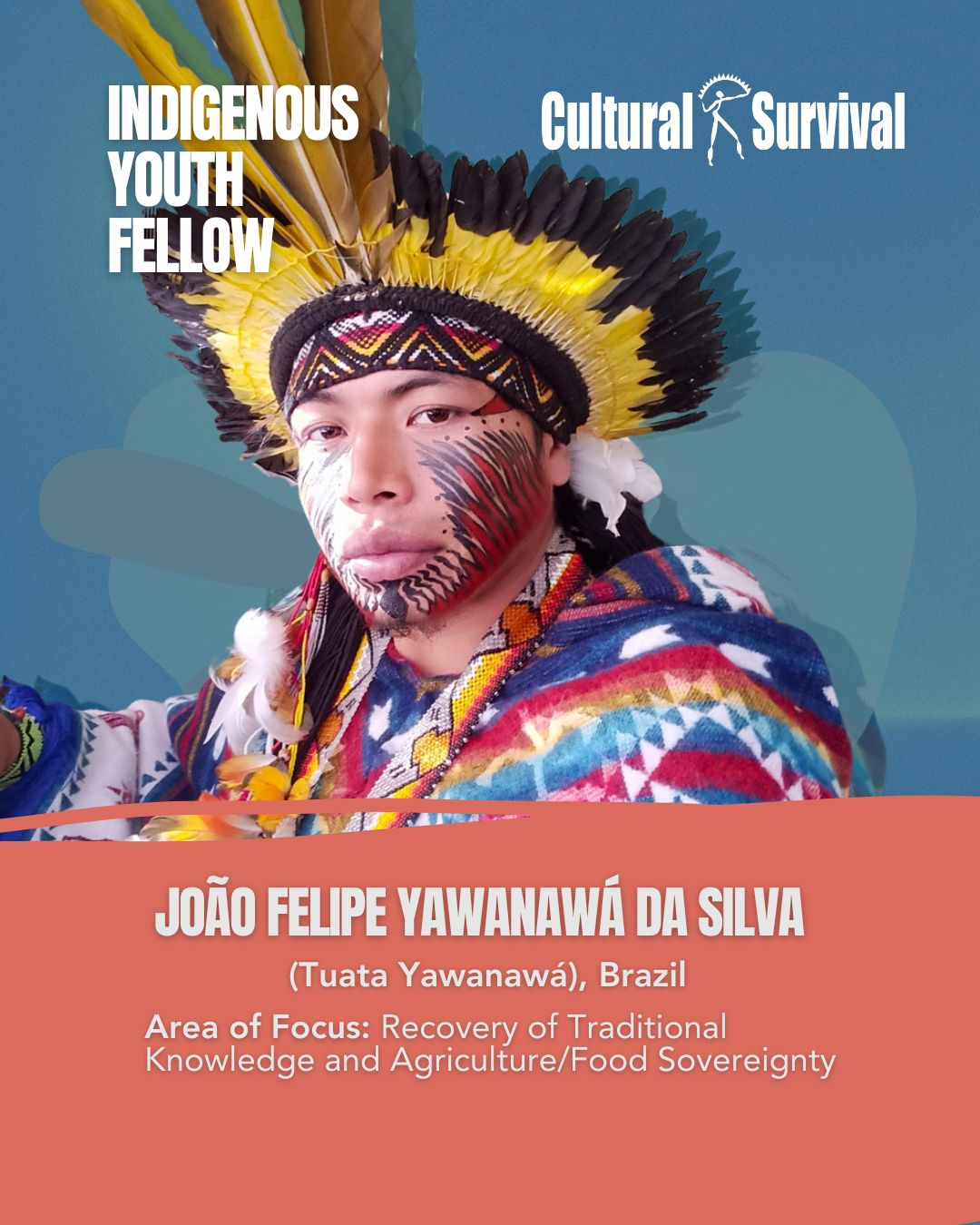
João Felipe Yawanawá da Silva (Tuata Yawanawá) from Brazil
Area of Focus: Recovery of Traditional Knowledge and Agriculture/Food Sovereignty
João Felipe Yawanawá da Silva is a member of the Yawanawá People, born and raised in the Brazilian Amazon. He founded the Emâ Vena Center, which he and his family lead and manage. João is proud to be a role model and source of inspiration for other young people within his community as a mobilizer of new and existing projects. He works with traditional practices and the medicinal plants of his people, and is a talented musician who draws inspiration and strength from nature for his art and work. Coming from a family of farmers and healers, João continues to learn and advance in traditional agriculture. He constructs new planting spaces and engages in cultural preservation and the protection of nature, rivers, and forests in his territory. His project, “Emâ Vena,” aims to strengthen the preservation of the village's natural environment and contribute to the native reforestation of their territory.
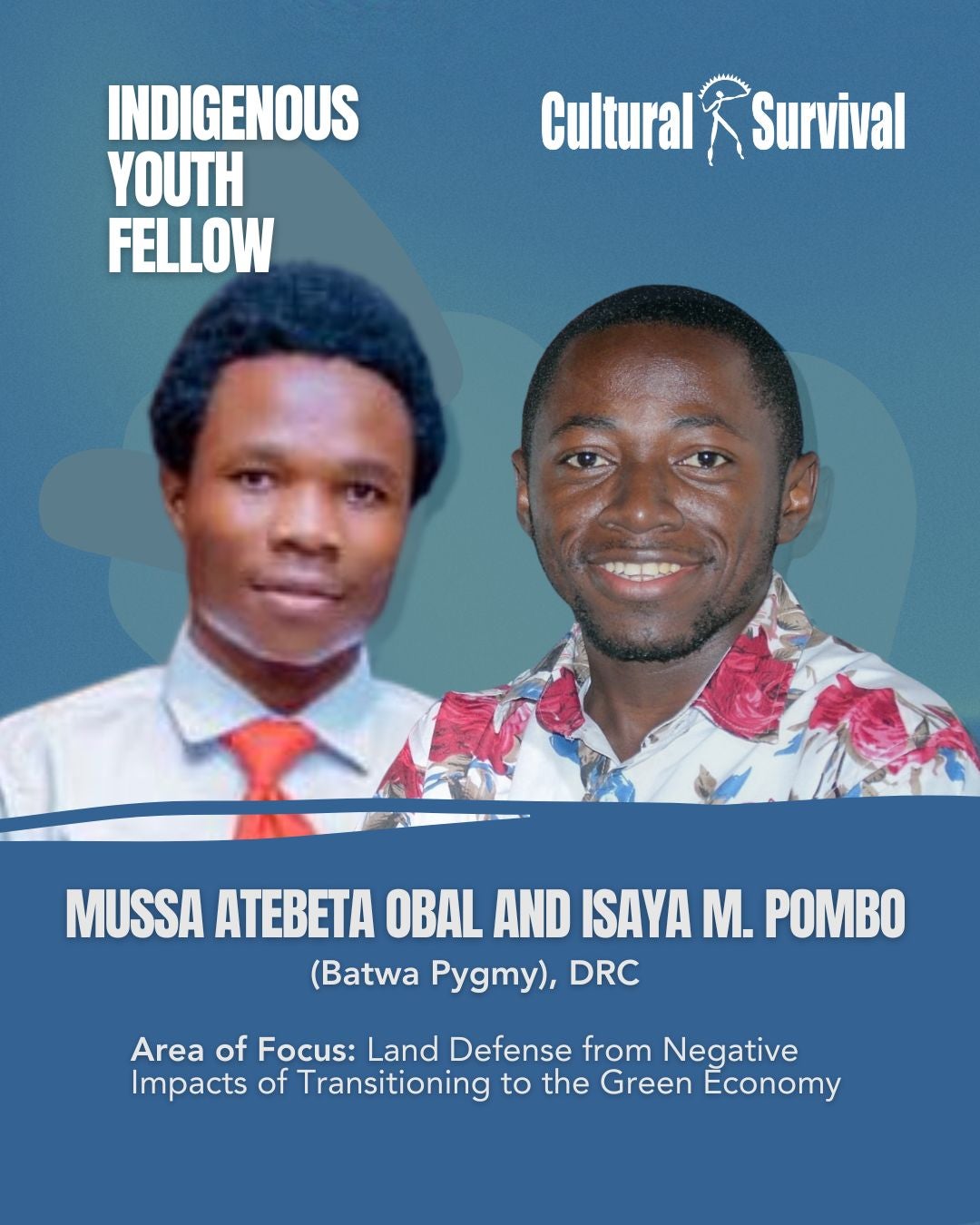
Mussa Atebeta Obal and Isaya M. Pombo (Batwa Pygmy) from DRC
Area of Focus: Land Defense from Negative Impacts of Transitioning to the Green Economy
Mussa Atebeta Obal is a Batwa Pygmy from the Democratic Republic of the Congo and volunteer Project Manager of the organization Action des Volontaires d'Innovation pour le Développement (AVID). He is also responsible for producing podcasts at the “Radio Voix de la Femme Autochtone,” another initiative of AVID. He graduated in Nursing Science from the Universitë Espoir Afrique of Bujumbura and is one of the first Indigenous people to graduate in the health domain from his region, putting his knowledge at the service of his community.
Isaya M. Pombo is a Batwa Pygmy from Baraka City in Sud-Kivu, DRC. He graduated with a degree in Information Technology from the Université Espoir Afrique of Bujumbura. He is a member of AVID, where he is in charge of new technologies and communication. He also works at Voix de la Femme Autochtone radio, which was created by AVID to amplify the voices of Indigenous women in defense of their rights and promote social cohesion in the eastern Congo. Isaya is proud of his roots and draws inspiration from his cultural identity to guide his actions. He aspires to a future where Indigenous Peoples live with dignity and respect, using technology to promote social justice and protect natural resources.
Cultural Survival support their project, “Creuser les minerais dans le respect des droits des peuples autochtones” (Digging for minerals while respecting the rights of Indigenous Peoples), which aims to educate the Indigenous communities along the shores of Lake Tanganyika and in the city of Baraka regarding the illicit exploitation of transition minerals in their territories and to promote respect for the rights of Indigenous Peoples.
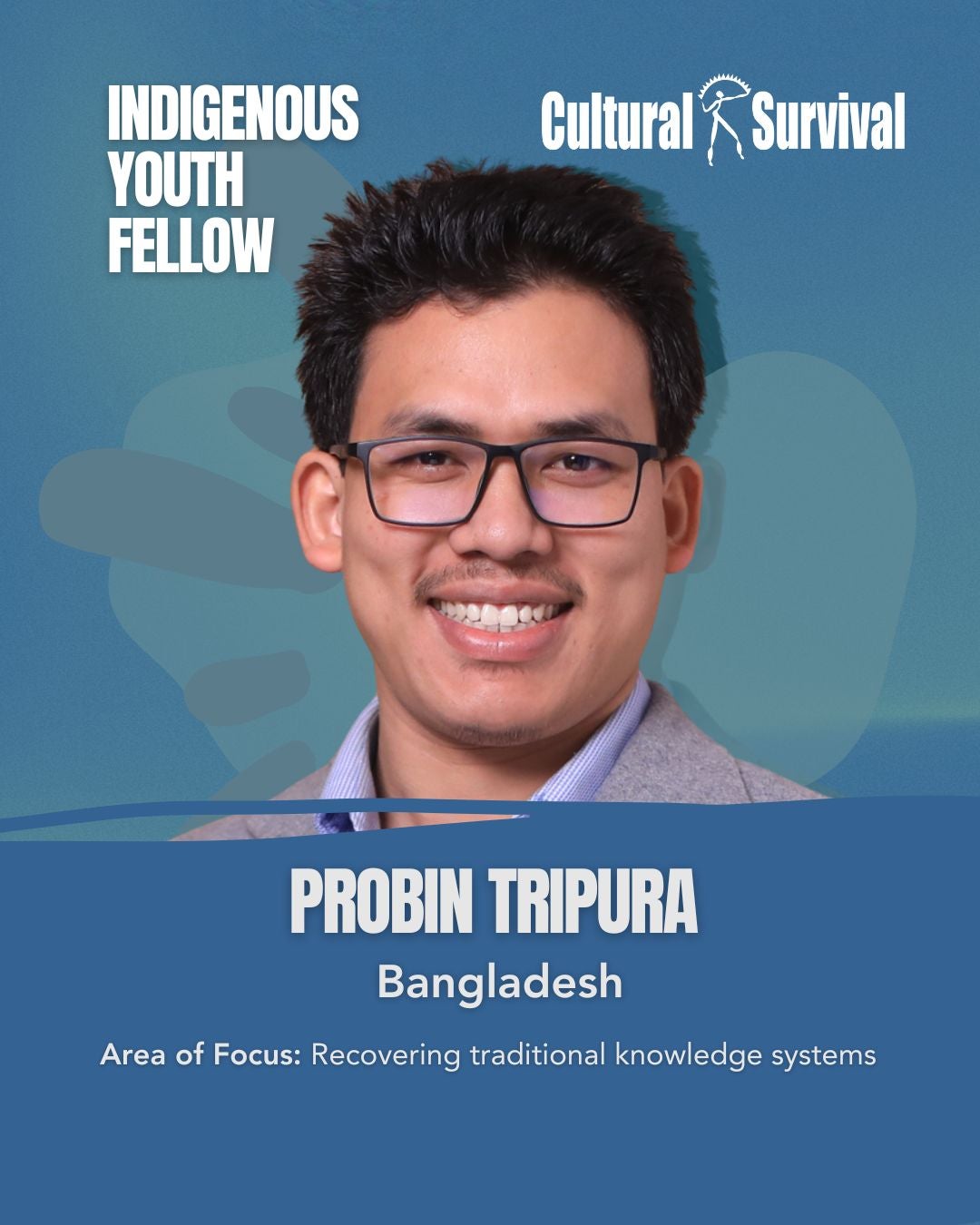
Probin Tripura (Tripura) from Bangladesh
Area of Focus: Recovering traditional knowledge systems
Probin Tripura is a youth activist and climate advocate from the Tripura community in Bangladesh. Currently, he is pursuing a postgraduate degree in Development Studies at BRAC University. Probin is a core member of the Indigenous youth-led initiative YARWNG, where he leads the Environment and Climate Justice team under the "Back to the Roots" movement. He is also involved in many other climate action-related activities, and has received training in Community Organizing in Sabah, Malaysia organized by PACOS Trust and supported by the Asia Indigenous People’s Pact. Probin has received several awards for his work, including the DYDF Youth Icon Award 2022 from the Dhrubotara Youth Development Foundation and the Women's Peace Ambassador Award 2021 from the Centre for Peace & Justice, BRAC University, and UN Women Bangladesh. He is currently conducting a project on Community Organizing in two Indigenous villages in Khagrachari, Bangladesh. Probin and his team are implementing a project to promote Indigenous Traditional Knowledge for sustainable climate change solutions in the Chittagong Hill Tracts, Bangladesh.
